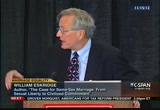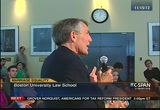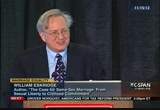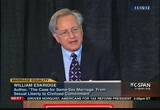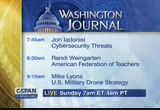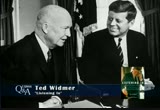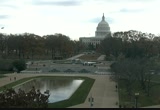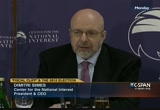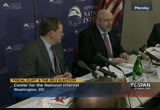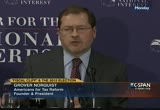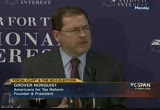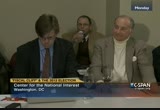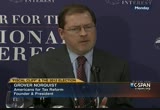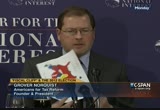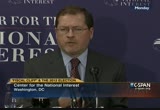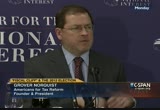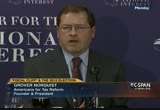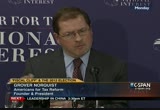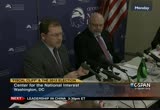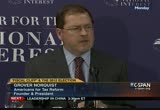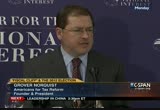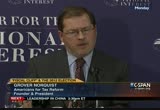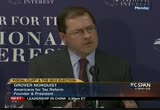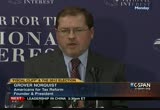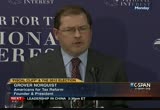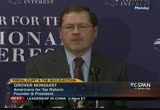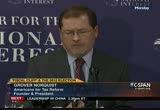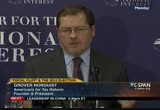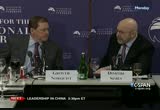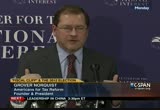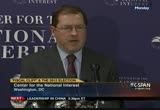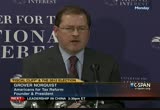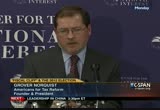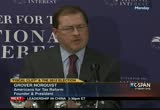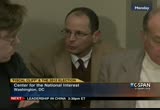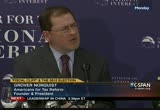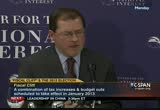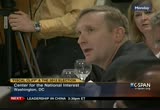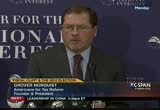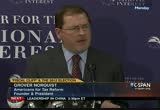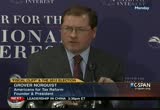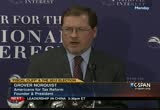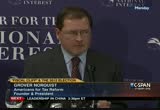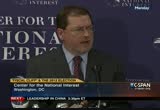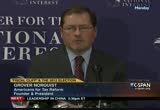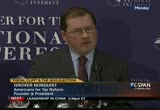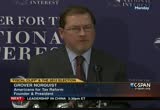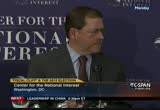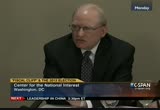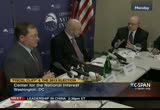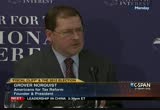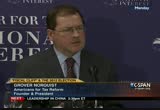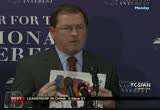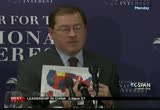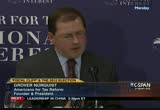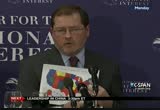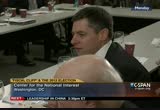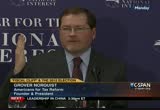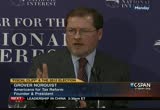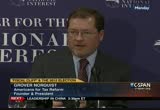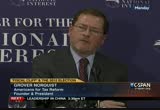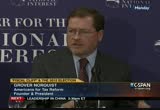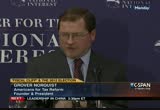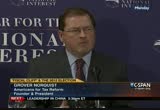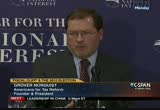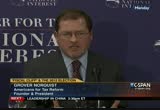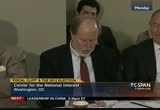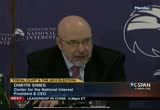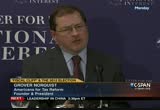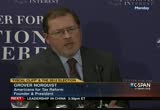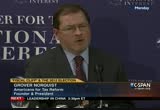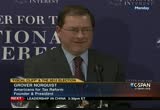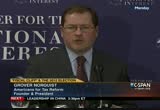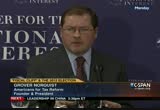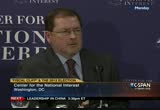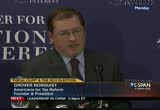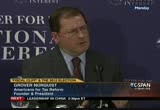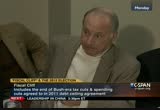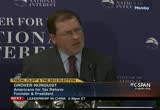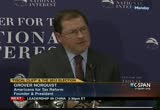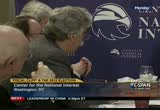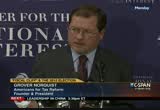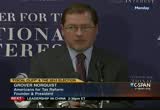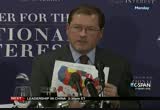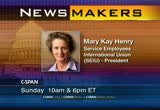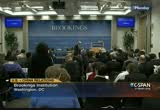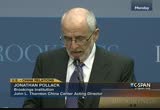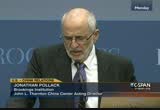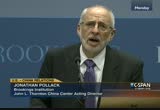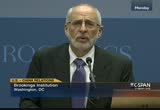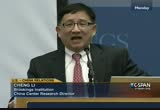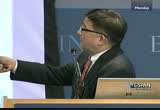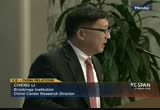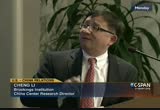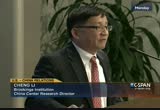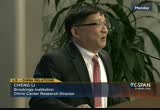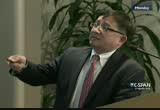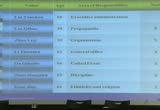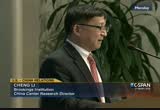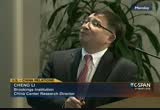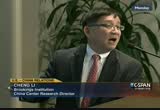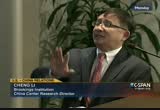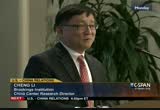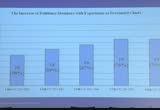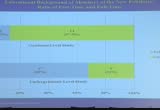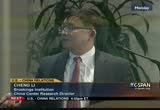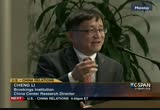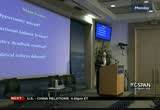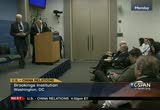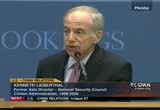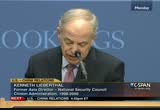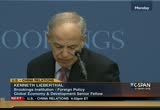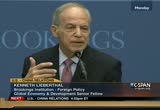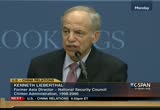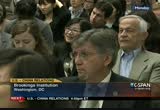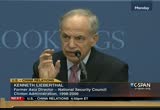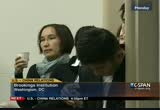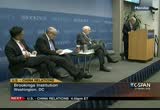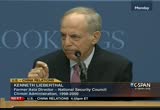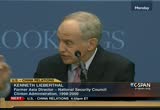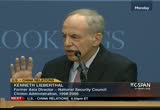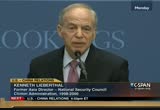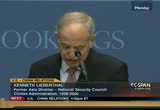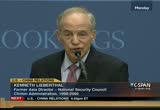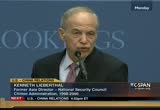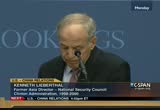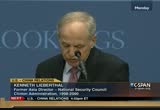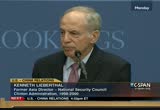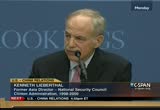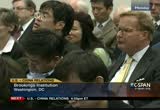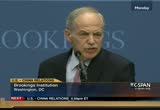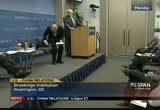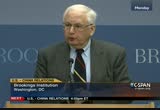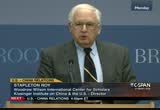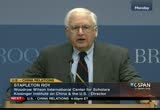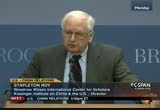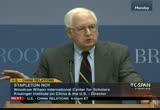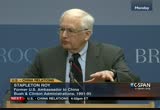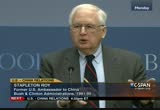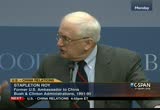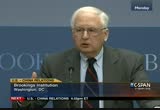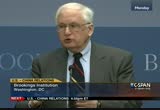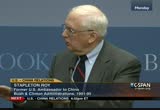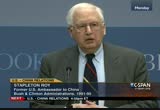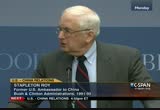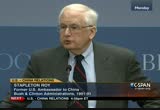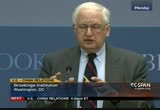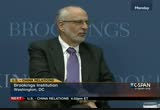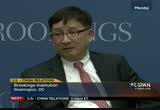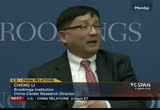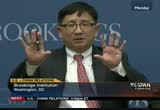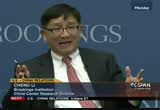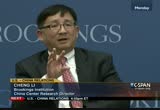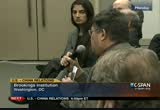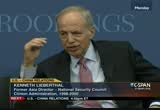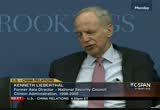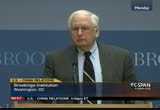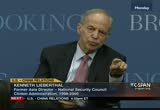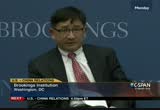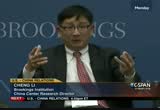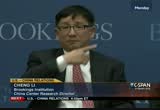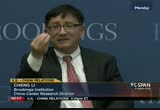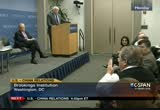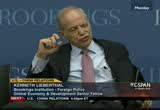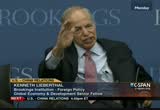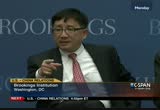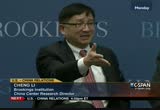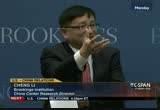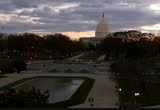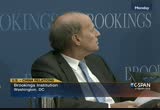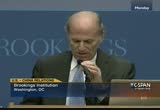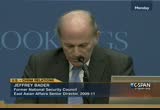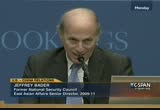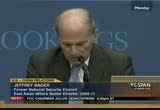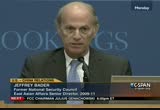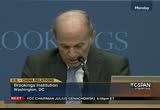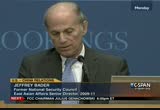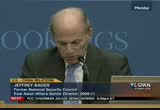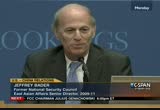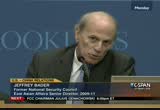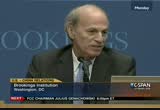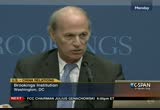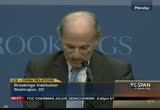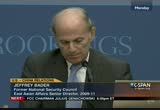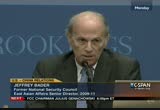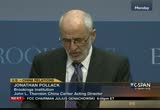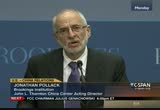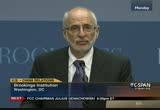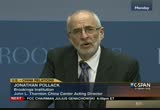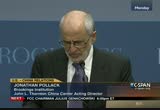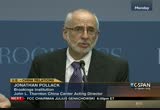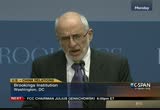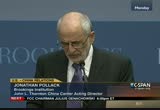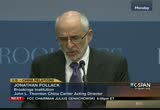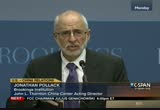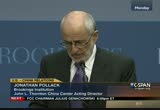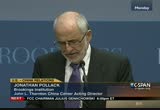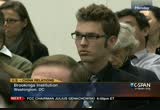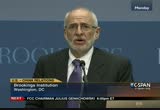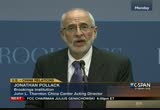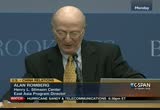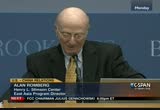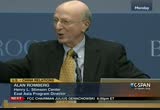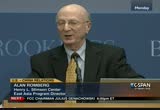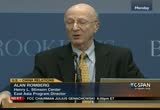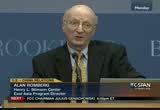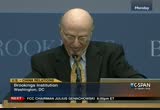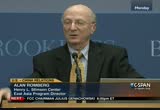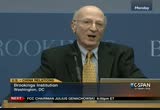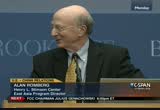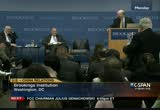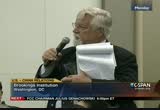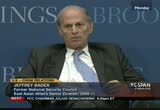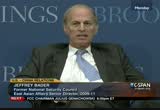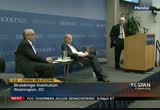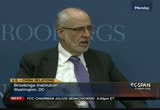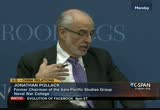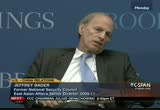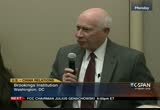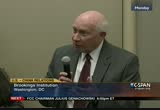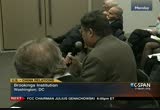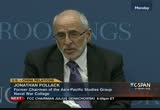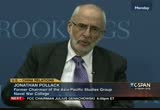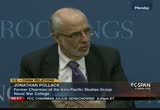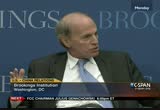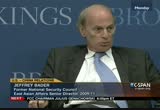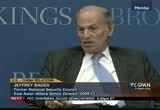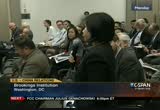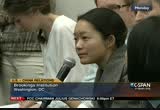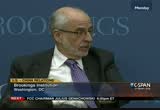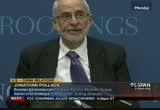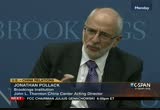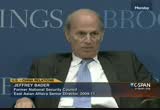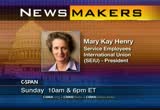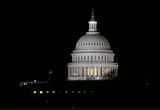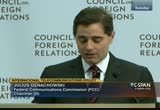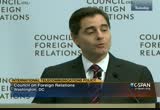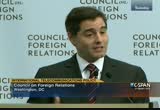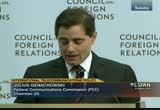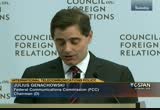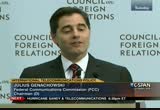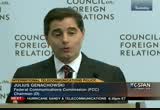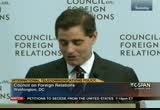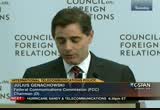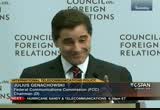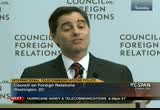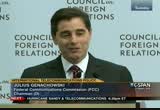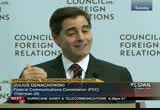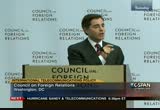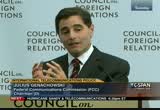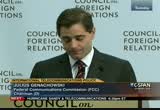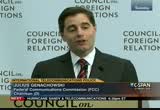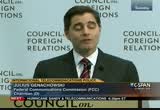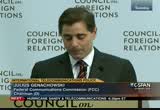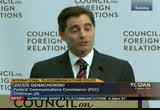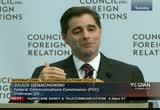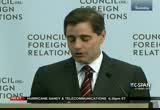tv Washington This Week CSPAN November 24, 2012 2:00pm-6:30pm EST
2:00 pm
of lesbian and gay relationships, intense opposition which often generates compromises and entrepreneurial thinkers and leaders that they hear is what might look like, here's what they've done in france, canada. i will leave you with that thought. i just published a journal. which goes about this in more detail. >> what you make me proud as a former law professor of what a law professor can do. you have done tremendous things for the case of marriage equality. my question follows up on your notion of marriage pluralism.
2:01 pm
my former colleague says marriage is two things -- a standard form contract that establishes certain kinds of liberal basic rights but also a sanctification. constituting form. she argues in liberal state has no business sanctifying relationships and that will be ought to be doing is be establishing, dis-establishing marriages altogether. do you see that 20 years and now when you give this talk will not even use the word marriage? >> it depends a william e. my liberal. if you are a libertarian liberal, as the cato institute
2:02 pm
is, they would say yes. if you are more of the state should create conditions for human flourishing, the answer is not simple. here is what i will say more broadly. one of the easy mistakes of the whole debate is an over investment in lesbian and gay people on marriage and family lot generally. most people who are in relationships are in relationships between different sexes. there are millions of them. they're wonderful. they produced a bolt of children. what goes on in family law is overwhelmingly what goes on in heterosexual relations this -- heterosexual relationships. it is moving in the liberal direction the way you are using the term.
2:03 pm
the theme of my georgetown article. it is moving every decade of my lifetime, family law. i think also family practice has moved away from the strongly sanctifying, sanctimonious relationship created by the state and make a limited by the state and marriage towards a more contractual approach. the colorado statute might be an example. the can literally popped in and out of the various rights and benefits. --opt in or out of the various rights and benefits. that is the direction we're headed in. europe as well. away from marchant towards cohabitation but cohabitation
2:04 pm
-- away from marriage and towards cohabitation. rather than enforce it in norm traditionally associated with marriage. >> i wish we had all afternoon but didn't have to go to class. thank you, professor eskridge. [applause] if anyone did not get to ask their questions, come up informally. >> tomorrow on "washington journal," a former navy seal
2:05 pm
talks about federal efforts to combat the growing national security threat. the president of the american federation of teachers discusses union by richard priorities and the negotiations to avert the so-called fiscal cliff. and michael lyons of the german national security project talks about a possible review of the military drum strategy. live on "washington journal" at 7:00 a.m. eastern. >> what about if the soviet union, a christian of announces tomorrow, which i think he will that if we attack cuba that it is going to be nuclear war? >> this thing is such a serious thing that we are going to be uneasy, and we know what is happening now.
2:06 pm
something may make these people see reason, but i do not think this will. i want to keep my own people very alert. >> hang on tight. >> it is a fascinating moment. it is amazing that eisenhower tells him to have his people alert. everyone is just completely on edge, so of course they are alert. kennedy laughed, and he jocularly says to hang on tight, which is a nice moment that even on this terribly tense day, they are able to joke a little bit with each other, especially with this crisis. i think they had a sense of how lonely it is to occupy that office and how you are getting all kinds of advice, getting good advice, getting a lot of faulty advice, which kennedy was. eisenhower knew all about faulty military advice, and he was able to speak with his supreme authority about the dangers as well as the advantages of military advice, so he was a
2:07 pm
very useful ally to president kennedy. >> "listening in: the secret white house recordings of john f. kennedy." on c-span's "q&a." >> next, grover norquist, president of americans for tax reform, talked about the so- called fiscal cliff and the upcoming tax bills in congress. he will also talk about the 2012 election and recent meetings at the white house between congressional leaders and president obama. this is an hour and 20 minutes. >> we are delighted to have grover norquist with us. of course, he is president of americans for tax reform but in the spirit of full disclosure, he is also a member of our board of directors and a very important colleague. grover spoke here several months ago, i should say here at the center, but not in this room because we moved -- there may be some glitches, so i apologize in advance.
2:08 pm
i am sure we will do better next time. however, grover talked about taxes, u.s. economic policy. but that was about taxes and the electoral campaign. now we had elections and the taxes are at the center of a very important political debate and at the center of negotiations between the obama administration and congress, particularly the republican controlled house. as i watched the president during his recent press conference and listened to leaders of the house, i think
2:09 pm
everybody agrees it would be highly desirable to reach a compromise. they also agree the elections provided a mandate. the president seems to think that he is the one who got the mandate and that republicans are saying, well, yes, mr. president, but me, too. and how do you reconcile two mandates and reach an agreement? what are the consequences of failing to do so? this is one of the most important issues facing the administration, the congress, and the nation. mr. norquist. >> several months ago i said there are two options for after the election. after the election, if romney was elected, he would have republican senate to go along with the house.
2:10 pm
they would pass the ryan plan, taking corporate and individual taxes to a 25% top rate, and having a territorial tax system rather than a worldwide tax system. on the spending side, do the ryan plan -- have entitlement reform, the means tested programs would be block granted. and the medicare would be premium support. this would drop from obama's spending plans about $6 trillion over the next decade. puts you on track towards a balanced budget. that is still the republican plan for when they have the house and senate and the presidency, but they did not get the white house or the senate in this election. that option moves off until you have a different president and senate. now we have a divided government. republican house, obama reelected, and a democrat majority in the senate enough republican votes to have -- to filibuster.
2:11 pm
we got the status quo. obama sometimes talks as if the status quo he got was the 2008 one. he won by several points against a war hero and got 256 democrats led by nancy pelosi in the senate and 60 democrats in the senate -- super majorities in both houses. i and others saw the likelihood the republicans will lose another three or four senate seats. there were no democrats we thought were -- might not come back then you had 2010. the republicans took the house with the rating -- with the reagan republican majority. which is not much more than gingrich had.
2:12 pm
and strengthened in the senate, and not to filibuster on anything he wanted to. and a weakened president because people voted against him based on his agenda today. what the democrats and republicans each hoped out of 2012 was, republicans thought they would finish this off and we did a straight line from 2008 to 2010 and now in 2012 we win the presidency and the senate. democrats thought the republican house was just a fluke. this was just a tea party thing, they will be swept out with the tide. almost all kickback -- cameback so we have these competing narratives. obama wins with a shrunken market. anybody else who won a second term that a larger merger -- margin of victory.
2:13 pm
even bush increased his. clinton increased his by six points. obama went from 7 down to three. 8 million fewer votes total. a little tough to seek a strong mandate there compared to say reagan's second term. you also have the challenge that all presidents are lame ducks as and as they get reelected. if you look at the present at the beginning of his term, he might be there for eight years. if you need something from the white house, you have eight years of having to deal with that person. we now have for years and ticking on a reelected president. the republican house menominee the bush -- ran on maintaining the bush lower tax rates. we have a mandate to. the democrats, when they got their majorities in the house,
2:14 pm
they got two landslides republicans only got one landslide. the republicans got their landslide in 2010, the year when everyone did redistricting for the next decade. democrats won the house for four years. as you move forward, would you look at what but passed out, the mandate -- they reelected the house. red states have republican governor and both houses legislator republican. 24 of them. 14 states have a democratic governor, a democratic legislature. these of the people who redistricted themselves. republican losses tended to be a california and illinois where democrats redistricted against republican incumbent.
2:15 pm
so people you thought my is what with the tide -- might be swept out with the tide were not. republicans like to have a 10 year run because of detecting -- because of redistricting. republicans have touched the third real. you have better republicans back now, all of whom had to answer 100 questions about the ryan plan and block granting and medicare and survived.
2:16 pm
the new guys have to face the same question in. i would argue you have a republican party that not only touched the third round rail and did not end up where all the smart people knew you would end up if you discussed and talk of reform. and now 10 years of the republican house committed to these reforms. all the things people flail about. republicans have passed the budget on the subject in the house. obama's budget does that do any of the things you what it did it -- a budget to do over the next decade. those of the two competing mandates. obama, at first you get this i won re-election, i'm king, and then as events happen, it becomes clear he denied it to do what ever you want.
2:17 pm
and they have enough votes to filibuster in the senate. and he will lead -- will need many increases in the debt ceiling. the last time as for an increase, republicans announced the toll for that would be the bigger role which is to put $5 in trillion. this begs the cost curve down going into the future. so that is where we are on tenerife first, if nothing is done -- so that is where we are. on january 1, if nothing is done -- that is $500 billion in one year, $5 trillion over a decade. all small businesses will face
2:18 pm
not today's 35% but about 44% of taxes. that is a 20% increase in tax rate that higher income people, people that make more than $250,000 will pay but also half of all small business income. corporations like general motors that pay corporate rates, we will see the tax on small businesses jump as the president wishes, more than the 35 39.6, but up another 2, 3, 8 points on top of that.
2:19 pm
the fiscal cliff elapsing tax cuts. the second piece is the sequestration. $100 billion a year being sequestered from the increases in the budget. these are not cuts the way you or i think of cuts. these are budget increasing not as rapidly as the various agencies will buy them to. the $2 billion of that is out of national defense and $30 billion of that at the domestic discretionary -- $50 billion of that is out of national defense and $50 billion of that is
2:20 pm
domestic discretionary. will the republicans keep obama on a short leash and give him an allowance every month in return for better behavior or will they give him a debt ceiling that goes along time? what will happen? one option is looked to history. two years ago we faced exactly this situation, the 2001 2003 tax cuts all lapsed. we had a republican house coming in, and democratic senate and democratic president. why would that not the way you do? obama says i will hold my breath until i turn blue and stamp my feet.
2:21 pm
2 years ago he said he did not want to raise taxes on small businesses because it would damage the economy. now he thinks this economy is stronger than it was two years ago and we are in better shape to take the economic hit. it is an interesting question. if you go over the tax cliff and taxes are raised dramatically, the house would have our past -- will already have passed. on the sequester, i thought if republicans won the house and senate of the president say, since it -- sequestration would not happen. it denied give up any of the savings from the sequestered . but did so by impacted the
2:22 pm
pentagon less heavily than the sequestered it. but divided government, i think you get the question. president said he does not want to change the money for the pentagon. mitch mcconnell said we are not raising taxes to ransom the pentagon budget cuts. a lot of focus has been on the pentagon but these are more concerned about the $50 billion in domestic discretionary spending restraint every year. you did to the republican study committee. the announced all a thing worse than sequestration would not be having savings. this stampede attempted did not take. he denied a demand that the defense budget be remain untouched, either of the public opinion or the house.
2:23 pm
i think sequestration happens. the only thing i could imagine is if they -- the r's and d's would both rather take it out of entitlements rather than the annual budgets. could they cut a deal where they save the same amount of money but out of entitlements? that is the only compromise i could see. then you get to the grand bargain idea. it seems every time i have these conversations were people ask about the grand bargain, what is the non-negotiable for obama? he wants the top marginal tax rates to go up. he also wants to spend an additional 500 billion on another stimulus package. he is not willing to discuss entitlements. the republicans would like entitlement reform and not have the rates change. the fantasy is republicans would cave on marginal tax rates --
2:24 pm
they're non-negotiable -- and the president would cave on significant spending reform, something he has been president for four years and recommended none of. for two years he had the house and senate supermajorities. he did not do entitlement reform then. if he had done at that, he would have undercut the republican party's critique of his presidency. why would you do it now when you could have done it for two years? the fantasy the democrats really want to reform entitlements -- except they have never done that when they had power -- and democrats really want to raise taxes although they do the opposite of that when they have the power to do it. it is like the gift of the magi where the guy sells his watch to buy combs for his wife with her beautiful hair and she sells it to buy a chain for the watch. they each sacrificed the thing most important to them to give to each other.
2:25 pm
they were married, they were friends. they were trying to be nice to each other. i do not think we have the set of structures here. strikes me as an odd prediction. so we go closer and closer. the two things i have been recommending -- all the negotiations be on c-span. the we do not have any more obamacare close rooms except for the insurance companies. that should be written and argued and discussed with c- span cameras. we promised not to be snarky about
2:26 pm
we will take it now as a step of the right direction. i think will be very interesting to see you as willing to say yes and he does not want to. we learned a lot about how the president behaves behind closed doors. the second point, whatever is agreed to, it is to be put in writing and online for seven days. so every american will and can know what is on it and look at it and have other people take a look at it. there is a new verb in washington to be -- called to be tarped. the republicans about it were sold to a bill of goods by the bush white house -- by the white house.
2:27 pm
2:28 pm
tax change is not perhaps what they are advertised to be. republicans have lived through the '82 deal. spending went up, not down predict tax increases were real and stopping them. in 1990, the offered bush $2 -- $1 for every $2 a tax increase. we cheated reagan. he signed on to it. and threw away a perfectly good presidency. an otherwise successful presidency. because of that. we have twice gone into the grand bargain, the simpson bowles stuff
2:29 pm
some simple stuff, higher taxes for promises of spending cuts and the spending cuts do not happen in the taxes due and the american people get very grumpy at the people who raise their taxes and then spending restraint did not happen. what's going to happen? i don't know. i think we get a better deal if it is televised. i think we get a better agreement if it is available for the american people to see for seven days in a row. i think both parties have claims to a mandate. i prefer the cards the republicans hold because they hold them for 10 years, democrats -- the presidency for four. looking at the states which have senate races up, i think the argument that obama will have to essentially extend the tax cuts as is come from of the 20 d's who are up, many of them in quite red states and the r's
2:30 pm
-- either very strong candidates because they all survived in 2008 and got elected against the obama landslide that year. whereas obama agreed to continue the tax cuts because he feared his own reelection, this time it is the democrats in the senate in a similar position obama was. >> thank you very much. i believe there are two narratives and it seems like both are legitimate in their own way. but there is also the question of political psychology. and it is clear some republicans, some moderate republicans, some neo- conservatives, some people who were advisers to governor romney, that they do think that president obama got a mandate and suggest the republicans make major concessions. to what extent in your conversation with house republicans, to what extent this feeling is kind of common
2:31 pm
among rank and file members? >> the cheerful news from the taxpayer perspective is that the republicans are not at all spooked or distraught. a lot of people thought looking ahead a year ago, six months ago, that we would elect a republican president and senate. the sense of unhappiness republicans had was from the stock market didn't go up -- not that you lost your life savings -- you ended up with the status quo when we thought we were on a trend and were going to get the presidency and the senate. so, that was disappointing. you had people unhappy. it is a little hard to argue that the modern republican party running on a fundamental reform of entitlements which all the establishment people of washington said they are for -- but when republicans pass a budget that does it they say, though, where is the one with the tax increases? there are not interested in the fundamental reforms of
2:32 pm
entitlements but tax increases. the r's are holding. i talked to all the cheerful guys there and they are moving forward. remember, every time republicans have a bad election cycle -- 1964, 1974, 1976, 1982, 1986, 1998, 2006, 2008 -- all sorts of helpful people come out and explain that the modern republican party should turn left. and when the republican party has not taken that cheerful advice, they've done better. there is no sense of being spooked. people have been here before. there are always advocates, you should become liberal democrats, that would be a good idea. not the advice democrats get when they get a shellacking.
2:33 pm
it is not as credible. there is not a sense of panic. where i do think we have an intelligent rethinking going on -- and it is not even a shift so much as a change -- because the people who wanted to do it, wanted to do it three months or three years ago, is on immigration reform. there, the republican party should look at the fact that it should be doing much better and has done much better with the hispanic vote, but when they allowed a few loud voices to cow people into thinking that immigrant bashing is sound policy or politics, i think they are real dangers. the good news is there are a series of meetings that have been going on. i spent this weekend with the national coalition of hispanic state legislators in new mexico talking about these topics. the business community wants immigration reform.
2:34 pm
the communities of faith -- roman catholic church, very unhappy with the way obama is treating them today, the evangelicals and charismatic, the mormon church, most pro- immigrant church in the country. in utah, they pass a counter to the arizona bill -- here is your permit, you can stay around. the building blocks of the modern republican party, the free market people, those who understand labor and capital and means production understand this. and we ended up with a few loud voices that represented nobody but themselves, and yet there was this sense it -- there must be a jillion bullfrogs and the pound. but when you drain the town, there are three. spear them. i think there is a very serious discussion going on about immigration, and there should be.
2:35 pm
i have been at press conferences with jack kemp for years on that -- we just did not get attention. but now i think there is more attention and more focused and it will happen. we've seen a number of voices -- the head of the southern baptist convention will have long been good on this, and louder voice, clearer voice, more listened to voice. salem communications, major christian radio stations. on that, i think you will see movement. it is not that the republican party is not rethinking what it is doing, it is not just going to become the attack -- tax hike spend everything party -- the democrats. there is a place for people like that. but we are a party who wants to talk to every immigrant -- not just hispanics, but immigrants from all the countries in the world and say we will deal with you with respect and appreciation and the country would be better off with more of the year and not fewer.
2:36 pm
>> thank you very much. what we are going to do now is moved to general conversation. we have about 45 minutes. because c-span is here, my request is for everybody to introduce themselves briefly. not just people in the room but for those watching c-span, so they will be able to understand. >> jonathan rausch from brookings institution, national journal. here is a question -- if house republicans vote for a compromise that includes either a tax rate increase or a tax increase that is not revenue neutral, what should that member expect to happen in his primary race? >> good question. the taxpayer protection pledge is a pledge by design and share with all candidates, in a sense that i promised the people of my state and the american bible
2:37 pm
vote against any net tax increase -- either raising rates or broadening the base unless rates come down. tax reform, yes. simplification, absolutely. reduced taxes -- no net tax increase. most republicans in the house and senate have made that commitment. a handful of democrats. about 1300 state legislators and governors -- a lot of people have chosen to make a commitment to their constituents. people coming in and saying, grover, could you tell somebody it is ok for them to break their word to their constituents? no. i am not actually in this equation. these are commitments they made to their own voters when they got elected, that they would not support tax increases. they say -- look, when i go to washington i an not raising taxes. i and reforming government so it costs less. but there is a problem i will reform government and not say,
2:38 pm
hey, there is a problem so everybody said more money so we can continue what we have been doing for the last 20, 50, 70 years. when george herbert walker bush campaign with a promise not to raise taxes and turned around and raised taxes, in return for promises of spending cuts that did not happen, the american people unelected him. i did not think we needed to send a press release out to inform people that he raise taxes. when constituents do this, both democrats will run against them -- as he saw in utah, they beat mia love because she raise taxes as mayor. republicans to raise taxes to their own brand a great deal of damage, particularly if they put in writing to their constituents that that is not who they are and not what they do.
2:39 pm
>> grover, you alluded to this but i wish you would fleshes out. you mentioned there is roughly 60% of the republican caucus but represented by the study committee that as the only thing worse than sequestration would be no cuts at all -- alluded to the -- people trying to break a groundswell to protect the pentagon against the cuts. and related -- how problematic is it that the self-described conservatives like bill kristol called for tax increases to protect the pentagon which then allows the major media to say even conservatives like bill kristol support tax increases to protect the pentagon. like me from the cato institute declaring myself and abroad and therefore being supportive of it's out of the reform and sang even the liberal kato institute endorses entitlement reform. >> taking it back words -- bill kristol has been on record
2:40 pm
saying it conservative did not want to be the war party, he would join up with the liberal hawks -- the democrat liberal hawks. i am not quite sure where it is the plural in democrat liberal hawks. i get to one and then i cannot think of more. but it was an odd sort of threat but it was kind of an explanation that he does not see himself as a mainstream reagan republican, that everything -- not reaganite foreign-policy but hawkish foreign policy. is not surprising. it is what he does, but it is not at all transferable. there isn't a caucus in the house and senate that falls and that kerkorian -- in that category. there are some people who are appropriators who are always in
2:41 pm
danger of going to the dark side. the joke -- three parties in washington -- republicans, democrats, and appropriators. that has been approved -- improved a little bit with the ban on some of the targeted handout. not completely. i have talked to some guys who probably would wish that they could make some of the defense cuts the way. the romney people will serve the country and themselves when they ran the campaign that if the defense budget is cut, all these jobs would disappear. we just spent four years making fun of obama's multiplier that if the government spends x number of dollars you create jobs. that is like arguing that people who are involved in organ donations are creating additional kidneys. no, they are not, they are just moving them around. the government decree jobs the
2:42 pm
way to create a blood -- no, it does not. -- the government creates the governmentticks bri blood. no, it is not. the idea you can stand on one side of a lake, see obama with reebok attended the three buckets and walk around the other side and in front of msnbc cameras, announced that you are filling the water to great depths. that is keynesian economics. there are people who believe this stuff. i was taught in school. luckily, i refused to learn it. because it is nonsense. it takes a dollar from somebody -- otherwise, shoplifters and bank robbers would be considered very helpful because they are always moving money from one place to the other. and evidently you get twice as much money if you steal the
2:43 pm
first dollar, it turns into two. there are people with ph.d.'s who talk like this. but they are democrats. for the republicans to talk about how defense spending creates jobs, i think is unfortunate. you can make an argument that you need this airplane or this tank, or the canadians are being annoying again, keep an eye on them. i am all for that. we should have a strong national defense. but do not sell it as a jobs program. it is intellectually dishonest. it was a shame that it was done. [inaudible] >> patrick from reuters news. what are three revenue-raising provisions that a pledge signer can vote for in a fiscal cliff resolution? >> sure, the top marginal rate from 35 down to 25 you would have great supply-side effects.
2:44 pm
european average is 25. we are at 35. the canadians are at 17. they are not hemorrhaging cash. they are doing better. lower marginal tax -- tax rates count, lower capital gains tax count. obama taking the death tax up to 55% after a million dollars. you do not have to be rich to find your house increasing in value, and working for 50 years, having money saved up in a 401k and other places. supply-side tax reductions certainly count. selling assets -- you talk about the defense department sitting on a whole bunch of spectrum that it ought to make available and sell. a lot of assets you can sell. there is land you consult. a whole bunch of oil in the ground if obama gets out of the way of drilling on federal land rather than making it difficult.
2:45 pm
drilling for oil and natural gas on federal land has declined under obama. he says, look at all of this new drilling and natural gas. on private land where you cannot stop it yet. that is true. but taking a pro-growth approach on that would be helpful. [inaudible] it was the last time around, and it will be again, i am sure. boehner, and company, were talking about that last time around. >> your tax pledge is between the representatives and the people but you are seen as the umpire or arbiter. if there is a net increase in taxes, as an arbiter would you say it is in violation of the pledge and are you worried by the words you are hearing from speaker boehner? is he talking about a net tax increase or are people hearing it wrong? >> he said he is in favor of
2:46 pm
revenues coming from growth and serious spending restraint. one number that does not get tossed around is the cbo says if you grow at 4% a year -- congressional budget office -- they do static modeling. a whole bunch of things i think and this is the case for how important growth is and how to get it, but their number, if you grow 4% a year, reagan numbers, instead of 2% a year, france's last 20 years or obama's i point, you do that for a decade 2% additional growth, the federal government nets' $5 trillion more than it would have because more people working. if at this point from the bottom of recession, if obama's growth had been as strong as right in there would be 10 million more americans at work and gdp would be 10% higher. that is the cost of the regulatory attack and attack the
2:47 pm
tax and spending and that stuff rather than the approach right into. 10 million americans out of work because obama went in his direction rather than reagan's direction, 10% smaller gdp. the guys who want more money from the pentagon should be focused on economic growth and not try to take a larger piece of a shrinking pie. i think the growth is the only way to get out -- 4% a year instead of obama's rate for a decade and you wipe out obama's accumulated debt and his first term, the $5 trillion he has run up. i think there are very important focuses on growth. when we see something in writing -- i am not going to get involved in some hypothetical because every once in awhile i explain a hypothetical and then it gets turned into more than i perhaps said or intended to say.
2:48 pm
but when something is written down -- and the good news is you have it written down, you put it on line for seven days, and the press and the american people look at it. nobody has to call me -- is this a tax increase? take a look at it. it will be either clearly a tax increase or not. we did not have any problems with the 2011 budget deal. it was not a tax increase. easy. the 2010 budget deal -- not a tax increase. we got lots of deals and nobody calls me on the phone wondering whether it is a tax increase are not. usually people ask when they've got some new goldberg theory on how to raise taxes, and they think if they move in fast enough in front of me they will say, that is ok, wasn't it? wait a minute, set it down and look at it. >> you do not think republicans are actually talking about a net tax increase. >> obama once higher-margin a tax increase to punish people who work on saturdays.
2:49 pm
i do not think he will get that. i did not think there is an interest. any more and -- revenue from grove so he can pay down some of the dead and some of the bills he has run up, that is going to be necessary. it is not obama's $5 trillion -- we are going to have to pay it. i would rather do with a growth rather than higher taxes which would slow economic growth. >> bob with the national interest magazine. i would like to talk a little bit about the dual mandate your referred to and posit three quick propositions and see how the come to the other. the first is -- presidential elections are largely referendums on the incumbent for the incumbent party. in that vein, if that is the case, as i believe, you would have to say that barack obama's performance as judged by the electorate was not tremendous.
2:50 pm
perhaps lackluster but not perhaps as lackluster to make him ineligible for rehire. secondly, when the country is in serious deadlock as we are now -- it has happened in history but not often -- but it generally means the deadlock is focused on the definitional question, the question of the definition of america. then the question of this in the country is, is it going to go toward a european-style social democracy or is it going to go more toward traditional conservative populism of a jackson or a reagan. certainly, when a country manages to deal with such deadlocks or to change the direction, it comes only through presidential leadership.
2:51 pm
it doesn't come through any other means. so, you've got a lot of red here, and that may be a good harbinger for your party but it does not say anything about how the country is going to move forward in terms of what you promote. so, given all of that -- if you buy any of it -- to what extent do you see any way in the world that the next four years will be anything other than a continuation of the last four, -- struggling, muddling through, kicking the can down the road and not really dealing with the fundamental problems of america? >> 3 very good questions. i would say that obama's first term has two parts -- before and after the 2010 election, just as the clinton administration was also two parts. they never talk about -- the
2:52 pm
talk about the last six years, when republicans were present, -- were present, with welfare reform, but they never talk about the first two years when democrats ran everything and threaten to raise taxes. i am in favor of the last six years of the clinton administration -- a lower tax rates on capital gains. republicans wanted more. the beginning of spending restraints. and none of his spending policies took fruition. four years, two, two-year sections -- in obama's term. my suggestion is the third act looks a lot like 2011-2012. we talked about the dual mandate. personalama's ads or attacks on romney. romney gives people cancer. not morning in america. not -- here is my plan for the future, here is my entitlement reform, here is my plan. the republicans actually voted for and wrote down a real budget
2:53 pm
scored by cbo twice with virtually every republican voting for it in the house. they said it was the son of the house was the body that actually went through and give it more than once. they made it clear where they were going. obama ran against romney because he was going to raise taxes. the president won a mandate not to be romney for the next four years. because from the gives people cancer and is a bad person and is mean to dogs. he did not make a case for what he wants to do. he did not spend time on that in either defending his record or making the case what the next four years will look like, other than romney would be a bad person. but deadlock and gridlock is better than moving in the wrong direction. stasis the last two years have been an improvement than the first two years of his administration. talking about presidential leadership -- we will have a certain amount of good luck in
2:54 pm
washington on a number of issues. listing things obama once, the house of not for them, list the things the republicans want and obama is not for them and harry reid is not for the. at the state level -- you think taxing high income people does not affect growth? we are having an experiment. california. it is called maryland. i don't see any reason why we do not wait two years and see how california is doing with their new higher marginal tax rates on folks. and sales taxes on middle income people as well. illinois raising income taxes and sales taxes and maryland's -- a millionaire's tax for those -- they cannot leave because they are federal workers -- and those making a million dollars and walk across the border.
2:55 pm
they are testing obama's theories in the states. i think they should do it on a small state like vermont first and see how it works. but they wanted to california so we are doing california. texas and florida will give you an idea of how you can govern without an income tax -- not a 13% income-tax. people move. the kind of know what will happen -- indiana passed right to work, cutting taxes, giving half the kids in the state school choice, a voucher, a scholarship of $5,000. illinois just raise taxes so as not to reform the government pension system. who is going to build a factory within 100 miles on the western side of that border? any takers for the people who think jobs and opportunities are going to move into illinois, or not?
2:56 pm
why, if we know something it is not going to work, do we impose a nationally when we wanted to let the state level. people that the leading blue states for decades. not always to warmer climates -- states with lower income tax and less spending. people move to the states with fewer government services. really? why do we pretend that is what people want as opposed to what the unionized bureaucracy in the state government says it wants. we are also seeing test on school choice. louisiana and indiana both have over half a million people-plus will the full school of choice, democrats in arizona. democrats complaining if you allow school choice there would be organ harvesting something -- something awful will happen in. we will actually see how well it works. i think we are in very good shape. where will presidential
2:57 pm
leadership, from? we had 10 people running for president, some try to sell books, some auditioning for radio talk shows, some doing marriage counseling -- only a subset were running actually for president. and all of these lovely governors we have doing back flips and flops now, they were not there yet at the time. chris christie had just by doing incredible things. bobby jindal just not doing incredible things when it was time to pull the trigger on running. four years from now you could fill a room with seven successful republican governors who could govern and answer questions without shooting themselves in the foot. look, romney was the governor of massachusetts. i am from massachusetts -- prior to emigrating to the united states and live there. it is not the rest of the country. republican governor but 80% democrat -- you are a goalie, have to take shots on goal and he stopped a lot of the shots
2:58 pm
and he did amazing things on defense. but you could not say he governed the state. it is not reasonable because of the way it was structured. a difficult case to make and romney did not do it. >> grover, one thing you have not really talked about today is controlling are shrinking the size of government. you just talk about taxes. but the objective of holding the line or lowering the taxes is alternately supposed to be it to contain or reduce the size of government. do you feel closer or further from that goal today? >> much closer, and for two reasons. one was the tea party and the other was the ryan budget, the ryan plan. up until the tea party i would have been here and told you
2:59 pm
obama is going to spend too much money, but you can't get american people upset about spending too much, you have to wait until spending too much became a tax increase. that is why i thought the blood was eighth best -- the best defense. but obama showed with the same misreading of his mandate -- when some suggest obama is misreading his mandate, he did it four years ago. he threw away 70% approval rating within a few months. spend, spend, stimulus package written in the dark and all this other stuff. massive debt and spending. and you had 1 million going to the streets in august -- april 15, but i only just shown up and started spending like crazy. you then had a reaction from the tea party movement, which reacted in 2010. people lost the elections over spending too much. the first guy to get whacked was
3:00 pm
arlen specter of pennsylvania. i was working with him to try to get him reelected. he was going to be good on the labor union demands -- then not willing to have elections to prepare -- take power. he was going to be good on judges, final taxes. he was going to fend off the right of center primary and people to govern and to get reelected. obama came and said if you vote for stimulus, i will -- stay out of philadelphia and we could probably do things helpful to pennsylvania. and egos, i just won election. i am going to win the primary and sign on the stimulus and obama will stay out -- from against me. within two months he was unelectable all the spending issue. not the tax issue but spending. the pig in the python, a freshman class that came in in
3:01 pm
2010, with spending ringing in their ears. they are going to be focused on spending the way got elected 20 or 40 years ago were not -- reagan, texas, got it. regulations, got it. spending in general, but as a vote moving issue, it was. that is what is very shocking. and then ryan comes in -- i consider the ryan played to be all about spending, entitlement reform. bring spending down to 60% of gdp. obama's plan takes 38. the ryan plan versus the obama into the future -- although the obama thing and eventually blows up and get aspics' because he cannot calculate that amount of debt and what it would do to the country. the ryan plan is all about
3:02 pm
reforming entitlements suspending of the smaller percentage of gdp rather than a larger percentage. and the tax part, lower marginal, territorial system, gives you stronger economic growth. i think the modern republican party which has been field tested, veterans defending entitled the reform, and talking about that and having people try to beat them on it and trip them up is infinitely stronger than the republican party four years ago, six years ago, on the spending issue. every crisis -- spend more money on. never saw a crisis and said let's spend less. every crisis of bigger government. >> i do not say this election as a ringing endorsement of tea party or the ryan plan.
3:03 pm
can you tell me why did obama win? he promised to raise taxes. >> two things -- he dropped 8 million votes from the time before, the margin a got a shrinking. he was the incumbent. he ran a better campaign and we had a camera -- candidate who had a myriad laws, starting with the fact the introduced obamacare in massachusetts and pushed it. the little hard to be the candidate against obamacare when you have that happening. because it was massachusetts where he was governor, he did not have the kind of record mitch daniels would have or bobby jindal would have or rick scott -- rick perry, who could say this is what i did in my state with a republican legislature, we are doing interesting and cool things -- school choice. tort reform. romney had none of that in the background. they ran against romney when he was going to -- obama did say something the press did not focus on.
3:04 pm
although we sent it out as a press release. in 2008 he said i would never raise your taxes if you earn less than $250,000 a year -- not your income taxes, not your sales taxes or excise taxes. no tax increases. in 2010, august 8, starting in grand junction, colorado, he started to say and repeated verbatim again and again, my plan is that if you earn less than $250,000, i will not raise your income taxes next year. two changes in his promise that did not get talked about on cbs, nbc, cnn, or any of the networks. he just announced that he can do an energy tax tomorrow and not have broken his word. an energy tax, wacking the middle class. he could raise income taxes on
3:05 pm
people a year from now. which is why what he wanted to do is kick out the bush rates for those making less $250,000 a year. this is where you talk about the dual mandate. we are talking about marginal tax rates, higher income people and successful small businesses. that raises $400 billion -- there are other taxes, in addition to the rate increases he wants to include. over a decade. he has $800 billion he plans to raise from higher income people. the size of the debt -- if he gets that, in his budget, assuming he gets the tax hike -- he raises $8 trillion in debt over the next decade. having solved less than 10% of the problem, he then comes back and says, now, who is going to pay the $8 trillion? that is the energy tax. which, of course, the treasury department -- carbon in e-mails several thousand -- are the typing it out on carbon paper? you cannot turn the united states into a european social
3:06 pm
welfare system with the income tax. it can't be done. rates have to be too high. people will not pay it. and you have all the problems that carter had with the same challenges. double taxing savings and investment and business income just gets to be too heavy a burden. every major country that introduced the vat, it stayed in. we are now looking at the entry point for the vat is energy tax and when asked about it the obama people say if the
3:07 pm
republicans were to recommend we would be all over it. the guy who promised he would not raise taxes on the middle income sank if somebody else touches the murder weapon first he would be right there. he is for looting the middle class. he just wants republican fingerprints on the process. so, either we let -- we win or lose this fight on the tax increase on but none of the people -- that is not the target, it does not give you any money. you cannot turn to friends that way. in need the tax on the middle class, vat, energy tax, and that is what the second term is all about. until we get past the stupid -- raising taxes on a handful of people and we still have $8 trillion in additional debt me is running up over the decade. yes, got to fix that, don't we? you know who the target is? >> from "los angeles times." two questions -- a quick follow- up from bill schneider's. the white house likes to point to exit polls that appears to
3:08 pm
show 60% of the voting public was in favor of increasing marginal tax rates at least on the top two percent. why are they wrong? in an earlier exchange of the phrase was used -- if republicans are talking about tax increases -- actually, republicans are talking about tax increases. calling it revenue increases as part of the deal. plenty of republican members of congress are scrambling are looking for ways to tinker with things are then marginal tax rates. i will name three specific members who have talked about it or something very much to like it, all who signed the pledge. bob corker, tom coburn, and john mccain. what is going on here? it certainly looks to a layman that there is a desperate scramble to find a way to raise revenue in a cbo-scoreable way that would not be seen as violating the pledge. the question is, is the pledge losing its magic? >> i really take very strong exception to taking this poll seriously.
3:09 pm
because if you ask people, the vast majority of whom are not going to be subjected to this tax, and they are being told that somebody else will have to pay it -- and if you discover in the process that only 60% of the voters are in favor of that, i think it speaks for itself and speaks very well of the american people.
3:10 pm
if you have a public opinion poll where the voters would be asked how would you feel if we cut all of your taxes by half, and also give your children free tuition, except we would have to have a referendum on exiling barack obama from the united states, i would be interesting to hear the results of this vote. polls like that in my view should not be part of the serious conversation. everything else you said i completely agree with. [laughter] >> by contemporary standards that means i've won. [laughter] >> the exit poll that was done asked several questions and if you cut and paste some of them you get to 60% number. but they actually asked a question that it's interesting that people in the press to come up with a 60% number ignore an actual question was, should you raise taxes to reduce the debt, which is the question which is on the table, 63% said no. you can also look at the history of questions when they have the same questions raised on the discussion over the debt ceiling increase. if we raise taxes on the rich, do you believe it will end up taxing the middle class? yes, 75%. if we raise taxes in this budget deal, you think they will
3:11 pm
just spend the money? 63% said, yes, they will just spend the money. it can get some of -- if there were unicorns what color would you like -- from voters. but if you ask the question if they raise taxes, would they just ended? yes. if they are raising taxes on the rich, are they really coming after you? yes. people ask how come people are so much against attack from somebody else. california had an initiative last year to raise taxes on cigarettes. only 8% of the people in california smoke cigarettes. the only state that smoked less is utah, and they have a rule against it. in california it got voted down even though it was a tax on the other. i felt that was fairly interesting. on the pledge -- corker, mccain,
3:12 pm
and coburn. in the modern republican party neither of those are considered thought leaders on economic issues. corker just got reelected promising people in the state he will not do this, so did tom coburn and john mccain. i spent a lot of time when coburn when he was walking into the gang of six negotiations and i talked to him on the phone and send him a letter and i said here is the history of 1982, 1990. alley walking down the with unsavory people and this will not end well. he said, look, first of all -- we are not doing anything for tax increases, only revenue increases from growth. that is what we are doing. it was a letter to me but it was an open letter which he made public. made it clear that was the only kind of revenue it would be for. in conversation he kept saying -- i don't think they will let us have spending restraint
3:13 pm
until there are tax increases. he was wrong and everyone else was right because in the budget control act, $2.50 trillion -- but no tax increases. he actually had to walk out of the negotiations because when he sat there with dick durbin -- he said, grover, i am not really for tax increases. i and just putting tax increases on the table here and durbin is giving me all of these spending cuts and i have not agreed to anything. i just talk about tax increases. i said -- senator, do you think it is possible durbin goes back to the democratic caucus and says i am putting these imaginary spending cuts on the table -- and he is giving me the tax increases. tom coburn from oklahoma said he would never be that dishonest. senator, i think he is and i think you are not. and i think he takes you seriously and i think you should not take him seriously. but again, they spend more than a year putting a the simpson- bowles commission, which, if you have seen a, a slide presentation, an outline, it is in haiku, the only numbers and the page numbers. it is a series of interesting things. there are specific about the
3:14 pm
tax burden going up by -- $5 trillion in tax increases. as ryan reads this as a trillion dollars in tax increases from eliminating or reducing deductions and exemptions and so one. and ryan sees that in addition to the five. i don't read that in the essay that is simpson-bowles, but ryan was in the discussions and i was not. it is either $5 trillion tax increase with a billion specified and the rest not, or $6 trillion deficit with the goals set up plus the one. $6 trillion tax increase or five. particularly since the spending cuts have been agreed to buy none of the democrats.
3:15 pm
we do know obama included -- he said nice things about simpson- bowles. there are some spending restraints. not a single one of those ideas was put into obama's budget, not one. we know he is not for any of that. when republicans offered to put them into subsequent savings from the budget control act, the democrats all objected. they are officially against every saving -- every saving discussed in simpson-bowles. so, when they spent nine months discussing simpson-bowles, a $5 trillion tax increase and hint at tax reform and spending reform, and when they finally went into the room to see what they came up with, they did not have legislative language which it of taken two weeks and then
3:16 pm
-- done by staffers. a pilot typewritten -- pile of typewritten pages that the says "all work and no play makes jack a bellboy" if you watch the movie. nothing in nine months. it is not real. people say this imaginary agreement that is not written down -- massive tax increases, a little on spending, simpson- bowles is a distraction from the fact that the two parties fundamentally disagree on the direction of the country, and this is where we have people who tell you why don't we have the good old days of bipartisan compromise, they are telling you how old they are. because they are old enough to remember 30 years ago when parties did not mean anything in terms of being right or left. >> has the pledge lost its magic? when i look and see what looks like an erosion of the pledge in the republican ranks. >> you are mistaken -- but all through 2010 and 2011 there were headlines of the major
3:17 pm
newspapers explaining republicans were about to raise taxes and the pledge is about to fall apart. this is the 27th time the assertion has been made in the last couple of years. if you look at it, the entire republican leadership has been elected on that commitment, in the house and the senate. the people who sometimes have a conversation -- you left out lindsey graham -- if the democrats gave us significant 10 to 1 entitlement reform i could, even though i promised people of south carolina i would not, i would vote for a tax increase to get this fundamental entitlement reform. i said, have you ever met a democrat willing to do that? i said, senator, you are offering a tax increase and return for a golden unicorn that the not exist and i did not stay up late at night because he said, look, anything that is not entitlement reform baked in the cake is phony. he is very dismissive of other people who lust after promises of tax cuts. he is going to be having a much tougher deal. so, i don't think that -- no, the commitment by the modern republican party house and
3:18 pm
senate, governors, is to reduce spending and not to raise taxes. although one can get a congressman or senator talk about a hypothetical and get in trouble. i usually call them after it has been in the paper and say, did you mean to endorse that? i have had discussions with corker and so as well. i do not think the d's will offer anything on spending that we even -- that would even tempt somebody to break their commitment to their constituents. >> grover, i am reminded that beethoven who was deaf famously said, "i shall hear in heaven." as you know, we have huge problems. the international environment is not part of the discussion. july 1914 in slow motion. we have a trillion dollar deficit plus. two-thirds of dodd-frank had not been written, etcetera. i have not heard any solutions. i think you are right -- you ought to published on-line bills, we don't do that. i think transparency is great. but we have a real situation that unless it is fixed, this fiscal cliff could be potentially catastrophic especially when it is added to what is happening in europe. what can do you think then begun positively given a deadlock? if we did not get this fixed, would you agree we have a huge problem? >> yes, we have a huge problem.
3:19 pm
the federal government has run up $5 joe in of that and nothing to show for it the last four years, the economy is weak -- the government has run up $5 trillion in debt. you go back into the century, they have all recoup a lot faster than this one. obama and hoover both reacted the same way to a recession, which was more spending, higher taxes, and massive new
3:20 pm
regulations and fdr -- who had not done anything hoover had not done already, except the sec, are doing the same thing. i think there was very serious damage done to the economy and world economy by the approach as bush has done running up to this and obama has put on steroids. there were many problems with bush allowing the clinton changes with fannie mae and freddie mac to continue, to not be ended. and that was a very big problem. this hostility -- the tea party, i understand because they change the direction of the modern republican party to make it much more serious about spending and it was not before.
3:21 pm
>> how you fix it? complaining does not work. >> house republicans have already passed a budget that would work. the past an extension of the tax cuts that would work. you go in and have the conversations in front of the american people without ads about how romney is mean to dogs and cause cancer and actually talking about issues. i think that is the debate we need to have. we certainly did not have it in this last election. we can have it now. it is very helpful. i think at the end of the day we will make the right decision, partially because the democrats and terrified -- but cliff he -- obama is threatening to drive the mover and the will not actually do that as obama
3:22 pm
threatened to pull us off a cliff a year ago august and did not. >> i thought i nailed down where i thought you were, that were not going to get the negotiations required to not sail along the fiscal cliff. >> the tax hike and the sequester, i consider them very different projects. obama is trying to put them together. the same way the guy who does three card monte. >> what i hear is one of them will be sailing off january 1. and at that point, doctors quit accepting medicare because they get 30% less, i believe the number is, payroll taxes go up, which sort of weeks all the people up, the 90% that never heard of sequester. i am having a very difficult time visualizing what february looks like when the press gets ahold of this, and then all of a sudden we also have the debt limit.
3:23 pm
i just can't see what we're going to do -- >> the debt limit is an additional tool to explain to obama that he is not the king, ok, and like henry the eighth, you have to go to parliament for money. he might want to nationalize the monasteries, but i do not think you can get as much these days as you could back then with that approach. you've got to go to parliament, you've got to go to congress for resources, for a debt ceiling and for all of these things. look, it will dawn on him that he is not the king, not the duke. he is one of the guys and a constitutional government that has very limited powers. he should get on the phone with other people who have been
3:24 pm
president and second terms -- as clinton what he got a compass and a second term which did not include citing republican legislation. -- ask, and what he got accomplished in the second term which the not include signing republican legislation? i think he has to recognize the damage he has done on spending, on taxes, regulation. we are about to hit all the ugly bits of obamacare. they passed obamacare, 3000 pages. there is a reason they did not pass it in 12 pieces. if i was running a bill i thought was popular -- let's cut the death tax, capital gains, different pieces of legislation. you wanted people to watch it. that is not how they did it obamacare. they bundled it up because they thought there were incredible pieces in it? no. two things they were proud of that would happen immediately -- pre-existing conditions and 26 year olds can stay at home on mom and dad's insurance. the rest is a series of tax
3:25 pm
increases and taking away your ability to have health care as you understood it prior to everything they told you not. a very unpleasant set of surprises for the american people on obamacare all the way in the future. this tax increase, the sequestration, this is not the only bumpy part of the road. and the massive problems of regulations on banks. there is a lot of damage to the economy yet to be done. they will try to shut down fracking. that is why i would argue that when we look at this fight, 30 read states doing better than 13 bluer states and the voices are out there -- a lot of different approaches people are taking, including how they handle obamacare. >> thank you very much and thank you all for what i think it's a very good conversation. i am not sure whether grover was able to persuade everyone. but your position was quite clear and i think well understood. president obama going to be reasonable -- it is how you define reasonable.
3:26 pm
thank you very much. [applause] [captioning performed by national captioning institute] [captions copyright national cable satellite corp. 2012] >> the thought of what is like in the inf negotiations. he can see this tomorrow at 10:00 a.m. and again at 6:00 p.m. eastern here on c-span. >> john as for the evolution of facebook. he advises the ceo and talks about the feldman on the social media side like the new speed. what should i did 8:00 p.m.
3:27 pm
eastern here on c-span. >> if we turn away from the needs, we align ourselves with those forces without bringing about this suffering. >> we ought to take advantage of that. it is nothing short of a public health service. >> there is so much influence. it is a shame to waste it. >> i think they serve as a window to the path to what is going on with american women. >> this is the only one in the
3:28 pm
broad you can trust. >> many of the women who were first ladies were journalists. >> they are more interesting as human beings than their husbands. if only because they are not first and foremast to find. >> dolly madison loved every minute. >> he warrantor has been, you cannot roll without including what women want. >> for you are a little breathless. i think it was a little too fast. >> he is probably the most tragic of all. they never should have married. >> she later wrote in her memoir that she says she never
3:29 pm
made any decisions. i only decided what was important and win. you stop and think about how much power that is. >> part of the battle against cancer is to fight the fear that accompanies the disease. >> she transforms the way but at the roles and made possible for accomplished able to survive and to flourish. i do not know how many presidents was pulling that kind of impact on the way live our lives. >> i'm constantly reminded of of the people who live there before and all of the women. >> first lady's influence an
3:30 pm
image, a new series on c-span, produced in cooperation with the white house historical association coming in february 2013. now a look at china's transition of power in its 18th national congress. this is 1.5 hours. >> good morning and elcome. i'm jonathan pollock, i am delighted to have all of you here for what i think is going to be a most revealing set of events. less than two weeks ago, the united states and china culminated two very different political process these through
3:31 pm
which the leaders of the two countries were either elected or selected to serve. in the u.s. case, it was a very public and openly fought processing resulting in president obama's reelection for a second term. in the chinese case, the decisions were made behind closed doors and by non- transparent means. resulting in the appointments of senior leaders of the eighteenth party congress of the chinese communist party, the new general secretary of the chinese communist party as well as chairman of the military commission. this morning, we plan to review the political things we have observed in both systems, asked what they can foretell about the future political and economic directions in terms of debate in both countries. some of the major challenges that i think confronted both
3:32 pm
leaderships, and assess the possible implications for u.s.- china relations and east asia as a whole. our focus will be much more of the chinese side of the story. i think that this reflects the enormity of the challenges both internal and extern all that china confronts. the extent of leadership turnover in china, the question of whether new leaders will follow an old script or whether they will pursue very different paths than their predecessors in office. at the same time, the united states confronts prodigious challenges of its own.
3:33 pm
even as president obama must replace many of the must replace many of the lead officials that have been responsible for the formulation of u.s.-china policy during the first term. the questions, some of them are quite obvious but it is important to state them at the outset. should we anticipate continuity or discontinuity in the bilateral relationship. how will leadership seeks to
3:34 pm
protect and advance their interests? will this reinforce or undermine the capacity at the incentives of both leaderships to cooperate on international issues? and what are the potential consequences if there is increased stress and additional fault lines introduced into the bilateral relationship? what should we be looking for anticipating in the weeks and months ahead? i am joined this morning by three of my colleagues from the china center and by distinguished experts. they will respond to the presentations by the panelists at a moderate the ensuing discussions. we will try to allow for as much time as possible to get questions from the audience. our opening panel will address chide of's new leadership and their prospects. i am joined by a senior fellow and director of research at the thornton center. the senior fellow at past director of the center, and the former u.s. ambassador to china, director of the kissinger institute at the woodrow wilson international center for scholars. and this afternoon, allen from the east-west center. sorry, the stimson center. since the presentation involved some slides, we will let him go first.
3:35 pm
and the rest of us will join him on the stage. the floor is yours. >> thank you, jonathan. i am honored to speak to you and with the ambassador whose writings have profoundly shaped by writing on the chinese policy over the years. in my presentation, i will cover three aspects. first, the scale and the scope of the leadership change. second, the main characteristics of the new leadership, by looking at korea, japan, educational background, and certainly, i will discuss what i believe are the main issues emerging from the party congress and the new leadership.
3:36 pm
first, the scale and scope of leadership change. this is an overview that i completed a couple days ago, he lifted the six major organizations that were elected or selected in the aging party congress. our new members, the first policy, there are 376, 240 of which are new members. it is about 64%. there is a difference in the inspection commission. that is about 77%. and the secretary organization in charge of affairs, a very
3:37 pm
important organization, 86%. in the powerful power bureau, 15 are new members. in the standing committee, 7. and also for the other members, seven are new. if you consider the military members ha, the percentage is 70%. this is a look at the previous party congress, 64%. the second highest 25 years ago. the chinese communist party, the internal turnover rate is quite impressive.
3:38 pm
and the european parliament members. we will look at the institution norm and laws. will also add my criticism. it is by and large second piece for transitional power. also, some of the major laws follow the age limit. in the previous party congress, it's high. there is a reason that bureaucratic representation, i have spent three days calculating these numbers. of the 62 leaders, how the provincial leaders, 31 entities, each have two people.
3:39 pm
except the party secretary at the party governor. each have three members. every major minister, there are four members, for others, there are two members. also, there are more candidates than seats. it is about 10% more candidates on the ballot. 10% are eliminated. these people, including the minister of commerce and the supervision rising star, a very powerful woman.
3:40 pm
some people are not of the ballots, including the governor. and also very powerful military figures that raised some of the concern and the criticism for the army. certainly, the most dramatic -- but he could not make to the central committee. i think the most important development is stepping down as chairman of the cmc. we can't understate the significance of that development
3:41 pm
because they are surrounded by two parties. by stepping down from that important position, it really consolidates the relationship of the party, the army, and the state. i also should say that some of the elections, it is not new. the difference is probably increasing 1% or 2%. 25 years, only 1%. this is the top seven, the lucky seven. several things are interesting. at one is the age. five years ago, they were
3:42 pm
members of the standing committee. five years later, they are still. that means there will be a major change. that will probably start immediately. secondly, the opposition. all of them are very much already confirmed, but it is unclear whether they will continue over the use of the vice president of the party. beijing said that they did not make the standing committee and will be vice president of the prc. we do not know. but all other are known. that list is not balanced. we divided the camps. one core group is --
3:43 pm
[indiscernible] many people in hong kong believe he has an affiliation, but he is even closer. that is the main issue of the media and public reaction focused on that. this entire bureau, the members are very much decided although there are still some changes in the state member share, etc.. the camp actually had more seats. it is more even. in that level, you see the balance. this is the new secretariat, in charge of the daily events. the propaganda, they are being
3:44 pm
counted as generally replacing them. he was a former director, and she is the no. 2 person in the discipline commission. it will be in charge of ethnicity and religion. ec more emphasis, they belong to the united front. the least four members of the communist youth league start their career. as i mentioned, half. and also for 30 years in the fleet, the secretary hires up. this is before the party conquest, talking about the military commission.
3:45 pm
3:46 pm
and these are the other important positions in the military. there are other new members, 10 military members, seven of which are new. like the composition, it will not be announced, there are still some changes. most of the rumors have different versions. the vice premier in charge of agriculture, as well as the other one replacing liu yandong. and the wang huning state councilor, there are rumors that he will take
3:47 pm
[indiscernible] military, d.o.d., state councilor, and chief of staff. it will also be minister of the police. this is a surprise, i still have difficulty understanding if he will replace [indiscernible] usually, it is also from propaganda. this is a big supply. the policy apparatus makes it short-lived. but still, there are members of the central committee that will become the state councilor.
3:48 pm
it is unclear. previously or still currently the treasury department had. and peng qing in charge of hong kong affairs. the financial teams, this is not the full list. but there are more important figures. [indiscernible] she has a nickname of china's larry summers. i do not know if that is good or bad. she is quite brilliant. and there is the minister of commerce. li wei, also making the fourth
3:49 pm
member of the central committee. these two from the research center, how they will move to external affairs. they are very limited in the high level. this time, the same. two people have visiting experience and one overseas, studying in iowa. another person who spent one year in the uk. that is yet. maybe another location, i will release my report. at the high level, it is quite limited. very quickly, the first year that korea had, this is about 25 members of the foreign
3:50 pm
bureau. actually, 19 of them, 76%, three quarters has problems with the party secretary. that is very important. so still, leadership is the main path. second, the rise and decline of technocrats based on my previous study early hot about these leaders. you concede the home secretary government in 1988. 1982, i wasn't here. but 1987 increased dramatically, about 70%, i'm sorry.
3:51 pm
this decline is very clear. the red color is the standing committee, the blue color is the party power. the fourteenth party congress and the sixteenth party congress, the members are all technocrats, 100%. but the decline of the party congress, and many others injured and declined. this time, this person as a technocrat. we really see a dramatic decline of technocrats. this is probably for most of the western audiences, not a big deal. but in china, it could be sensational. looking at these degrees, most
3:52 pm
of the advanced degrees, 88% -- only two really finished their masters degrees. what is surprising is the undergraduate level degree. it is a meritocracy that could be a serious criticism. if they can prove that capacity, i guess there will be some criticism. the most important fishing is about the rise of precincts. 14, 15, 16, 17, 18. this is the highest ever, 57%. [indiscernible] it reduces the percentage. still, it is unprecedented lehigh. it is very critical about the corruption. now, there aren't the main issues emerging from the party
3:53 pm
3:54 pm
but unfortunately, that did not happen. only a few will be eliminated, but that was because of people who that resisted strongly. in that regard, it is a very big disappointment, an opportunity missed. and broken in the highest level, it would be very costly. if they had won a lot of seats, they would pay a huge price in the years to come. and certainly, it is good news
3:55 pm
because previously we criticized these two factions. sometimes the deadlock could not really move on economic and foreign policy. most of them are capable. the financial economic sectors in the coastal region, that is very good news back and review some of the policy deadlock. finally, they could not make the standing committee. and because of a lack of real direction, political reform was delayed. it tends to push for economic reform because -- now there is an opportunity to prove that they are capable. it might up with their confidence, but we know that it
3:56 pm
3:57 pm
scope of his remarks. i will cover some of the same ground from a different angle. first on the congress itself, i thought this was not a very good show. it was divorced from public view, inviting social networks, and i was in beijing during part of the congress talking to everyone. they wanted popular ridicule on how it was being conducted. until the very last when through, there were of the revelations, going back to last spring, it continued right up to the eve of the congress. the final choices, i would argue, were not driven by proven capability. all of these people at the top, obviously, have a lot of capability. but it is not easy to make the argument that those that have demonstrated the greatest
3:58 pm
capability and proper management and executive initiative and so forth were the ones that made it on to the standing committee. overall, i think it was highlighted and symbolized how outdated to many aspects of the political system have become given the political realities. there were some silver linings in the cloud. let me highlight the ones that he indicated, and also add some to the list. the standing committee was reduced to seven members, i regard that as a good thing. it increases the chances of getting to make serious decisions. i agree very much with the willingness to give up his position as head of the military commission. it resolved the anomaly with several precedents in china for the incoming party secretary
3:59 pm
and president. again, we highlight the rules and continuity that you generally see. andlimits weren't here to, the notion of having more candidates than positions for the central committee did have some consequences and was a policy that was continued from the past. albeit not expanded. the major programmatic document for congress that was given at the opening session, it was overseen over a set of months. as was noted, the report gave strong endorsement of continuity and the accomplishments of the past five years, not surprisingly affirming that he
4:00 pm
had done a very good job all along with his colleagues. but there are a variety of lines in paragraphs 3 of the report that can be used by the new team if they wish to -- or wished to too that indicate real departures. we have seen this before. in retrospect, you see they provide justification and legitimacy for significant new departures for the new people who take over. here i would note the strong endorsement of the separation of government from enterprise, stronger endorsement than i have seen. this time, it really got a very strong plug. the notion that everyone, and i stress everyone, is subject to
4:01 pm
the law, regardless of political position, an independent judicial system, and so forth, and number of things that could be run with even though other major parts of the report seemed to move in a significantly opposite direction. more mixed was the fact that while i think they appropriately and understandably had a major focus on corruption and the need to deal with it, they equally strongly said it is the party that has the problem and it is up to the party to fix it. they're going to rely on a corrupt party to clean up its own mess. i think that is unfortunate because i do not think it has a very substantial chance of success.
4:02 pm
within a very constrained set of choices, if you look at the kind of rules of the game in china, they decided to select, the five oldest people eligible for paula bureau committee standing membership. given my age, i think that was a wise decision. i like to see bad precedent. this does speed up a major transition five years from now. five years from now there is a good chance that they will have a much better say in who comprises the rest of their team. they systematically went for the five oldest. on balance, i think the
4:03 pm
succession showed both the institutional as a nation of the system and a sharp limits on that institutionalism. starting to look ahead, here i want to posit 8 givens. there're eight things to me that are clearly the case, and then make some additional judgments on those. first, there is extremely widespread and serious recognition of the pressing need for major reforms. this is in terms of social tensions of which there are many and they are obvious, but also the analyses by eight economists, environmental specialists, keep people in the security arena, and so forth. there is great pressure inside and outside. second, reforms need to be both economic and political. all the major economic and
4:04 pm
social problems, such as inequality of wealth, environmental degradation, overreliance on s exports and fiscal development rely on the political system and not economic policies. therefore, little filled -- therefore, political fixes are necessary. political reform here need not seriously move toward western- style democratization. but failure to deal with deeply ingrained political practices will sharply limit the economic and social improvements that can be generated. third, reforms are necessary in and coming two years or so to avoid very deep problems a decade from now. in this regard, china is kind of like the united states. we have major decisions we have to make in the next two years to bend the curves. if we do not been the curves on
4:05 pm
expenditures and income, 10 years from now we are in deep, deep trouble. i would argue that the details are different in china, but the fundamental reality is the same. they have to make some major decisions that they have already outlined but have not implemented. they have to make major decisions to implement those changes in the next couple of years or they are in deep trouble 10 years from now. fourth, the priorities of not been made clear internally or publicly. he is both cable and cautious. i have seen speculation about his priorities and how strongly he will pursue them across the board. in china, they are all over the lot too. it is a little bit like barack obama in 2008. you can pour any content you want into this general image.
4:06 pm
we will have to see what content is really there. fifth, most other politburo standing committee members likewise have not tip their hands as to where they stand, either on individual reforms or on their overall priorities. you've got to keep in mind, you can have a group of people -- you have to keep in mind you can have a group of people, everyone favors reform. in a political system, you have to decide what is your top priority? what are you willing to use your political capital for? what is your second biggest priority because you are not likely to get to the third. uc obama facing that now with climate change, the fiscal deal, emigration, etc.. the issue is not whether he supports those, what is he willing to go to the mat for? i think what we face and the standing committee may be people in favor of reform but we do not have a clue as to whether they are prepared to go to the mat for the same reforms and
4:07 pm
whether they can reach agreement on tough decisions with an agreed upon priority for those decisions. the candidates who did to their hands as to what changes they would like to see did not make it on to the standing committee. they fixed it ties -- they do not get you far in anticipating substantive positions and priorities. that does not necessarily get you to there. but the substantive positions and priorities are important for anticipating what the future is going to hold. substantively, serious reform is a very complicated matter. much more complicated in china
4:08 pm
than in the u.s. given the array of reforms that are corte each country's future. you need to take that complexity into account and you anticipate what is going to occur there. in china this requires changes in the development model that china is pursuing and basically changes from the former model to the least what they stipulated in the five-year plan. something closer to what is in the world bank report that came out last spring. these are very complicated and wide ranging changes. there are deeply rooted vested interests that will oppose parts of the 12 fighter plan and these are powerful interests.
4:09 pm
local, territorial, and -- political leaders. this is in part because they benefit from the current development model. they have a lot of power within their bailiwicks and a lot of flexibility. it is in part i have been startled as i get into this issue more. many of these positions are bottom sold. this is not necessarily a meritocracy move. people did not handle themselves effectively. with five level political systems, in the thousand of these 40,000 territorial units. if you look at the top two people, 80,000 people you're talking about many of whom have purchased their positions and
4:10 pm
see them as a basis for future wealth. not easy to carry out reform. it changes the options. the big national level state owned enterprises are tied to the lead political families. none of the reforms will be resisted from them and many of the ministries resist reform and i think what we will see in the upcoming npc is the move toward the super-ministries and that is not necessarily going to help reform. you can argue it either way but that is my instinct. tefra forms will require tough decision making on the politburo standing committee. this is a division of labor, you can tell what each one's responsibility is and the consensus decision making role. not a majority but a consensus. you put this two things together and it is very hard to
4:11 pm
get decisions that run against the grain. of any of the members of the standing committee. you can get decisions to spend more money. it is hard to get decisions that this advantage key groups. we will see if they alter that system. surber reforms will require tackling sensitive issues. this is the commercialization of land, the scope of the state's role in allocating scarce resources and permissions and so forth. these are not easy issues to handle politically in any kind of political system. reforms are complicated. they touch a lot of interest and they run against the distribution of power. finally, this is a transition period until the national people's congress in march. beyond march, you have to
4:12 pm
assume there is some period of months before something is settled down. you're not likely to get serious of reforms implemented before you have the state council settle down and the transition over. therefore what should we expect from the 18th congress and i will move through this quickly? they may try to set a new tone. i just read his speech to the first study session of the new politburo and it was not encouraging in terms of moving away from jordan. it reminded me his graduate degree is in marxism. is zhi's preferences and operational priorities i think will only be revealed over time.
4:13 pm
the record to date, the does not provide sure guidance on this issue. let me conclude with some comments on each of broad categories and issues and what we might look for in each of we were to see significant reform take place. on restructuring the economy, again, we will have to wait until the latter part of 2013 at least before we can look for any of these things on a significant level. they indicate some things i will be looking for. first, there will reconfigure or have to reconfigure interest rates in the staid banking system to provide substantial positive returns on household savings. that should be the easiest of the steps they can take.
4:14 pm
they need to adopt measures to separate the government from enterprises. i think that is very tough and it runs against recent trends. i think there will have to open up what are the monopoly or quasi-monopoly sectors of the economy dominated by major state-owned enterprises and do so in sectors that are attractive for private firms to get into. open up railways as they have done. you cannot make money in the railway system. there are private firms that have interest if you have finances where there is money to be made it will be a different thing. they will have to undertake tax structure reform in order to create a legal basis for localities to raise budgetary funds. that is a short list of what they will have to do. even that is tough enough a
4:15 pm
short list that it may well take the perception of genuine crisis to produce steps toward the major economic structural reform with its attendant political changes. in dealing with society here is important and low hanging fruit types of steps to take. things that are so counterproductive that if they do not do these you wonder what they will do. my short list of that would be to abolish the system. this is the greatest single source of any quality of wealth. you cannot see how they will move the household savings, especially household spending has a major driver of the economy. if you maintain that system that prevents 300 million people living in cities from making serious money, acquiring serious property and exercising their rights as urban citizens. they can substitute criteria for urban residents is but they have to change fundamentally the system as it exists. secondly move to aid to child policy. one child is a catastrophe.
4:16 pm
this will have a long term impact but if they cannot do this at this point, you have to wonder about the ability to take on anything that is politically sensitive. third, establish a legal framework in which ngo's can operate more freely. for example, environment is one of the issues they tag is one of the most important challenges. i agree 100% with that. i know no major country in the world that has made significant progress on environmental cleanup without a vibrant, grain movement. and ngo grain movement that can engage in political activism as well as political education. systems are built around the interests of the leaders. you need some counterpressure. not just pressure from above but from below if you're going to change that. let me conclude with political reform. they need to reconfigure incentives for local officials. this is an enormously complex task. i will lay out why it is impossible to change the model
4:17 pm
without changing the operational incentives. otherwise their vested interests lead them to do what they are doing. regardless of where beijing thinks it is putting its money. they need to strengthen the independence of the legal system hopefully what to wear top officials are also subject to legal constraints. they need to increase genuine political competition through the townships level and within five years to the county level. leaving competition vega in detail. there are different things i could do but they need to move beyond what they have done today which is listening out somewhat the people's congress legislative system. fourth, they need to implement party rules on internal decisions and they keep talking about this but the progress seems to be limited. they need to seriously attacked corruption. one thing that being said in this speech the day or two ago,
4:18 pm
the one thing that he lit into was corruption and compared china to the middle east. he referred to other countries that had strong one-party system that have collapsed recently and said we have to tackle corruption. he recognizes certainly that the scope and magnitude of the problem frankly i am not optimistic about this. but i certainly wish them well. my bottom-line conclusion is that during the major crisis that creates leverage at the top, the odds of chinese reforms are well below those of u.s. reforms in the coming four years and i do not regard those as good news either for china or the united states.
4:19 pm
thank you. [applause] >> thank you. we have just had a very sobering presentation and an equally rich one by chung lee. we will post a transcript on the website so you should be watching for that. >> i will be looking eagerly for the transcript because i do not think you can get a better set of presentations in china's leadership transition then we
4:20 pm
have just received. chung lee has lived in depth at the political alignments and biographies, down to the sub- global that he did not get into at this time. he could discuss the sixth and seventh generation leaders and we're trying to analyze the fifth generation. dr. lieberthal's comments reflected an in-depth knowledge of the difficulties of pushing for reform in a country the size of china. this does not leave me a whole lot to say. i would try to tease out some additional elements that i think are important in thinking about china posing new leaders. first, one-party systems
4:21 pm
function differently from multi-party systems. one of the characteristics is that you do not know how leaders will behave until they are in the top spot. because you cannot get to the top spot if you are taking a different approach from the predecessor leaders. nobody identified deng zhao ping as a reformer. no one identified gorbachev as a radical reformer but he pushed through reforms a radical it ended up in the collapse of communist rule in the soviet union and the disintegration of the country. we have to be cautious in trying to assess exactly how they will perform as the top
4:22 pm
leaders. they're not supreme leaders. they have to preside over a collective leadership. and the attitudes of the other members of the collective farm important. but they are in the most influential positions to try to shape a sense of where the country should be moving. and if there is one thing that permeates the work report, it is the idea that there has to be fundamental reforms in china. i think this reflects the realities of the country. when you think about reform, ken went into this in detail but it is worth thinking about it at a higher oil.
4:23 pm
what are the influences that will affect the thinking of the leaders as they look at what needs to be done in china? the first thing is age. china has through this system of age limits, every time they have a significant change in leadership such as they just had, the age of the top leaders is reduced. in the case of the politburo, the average age is five years under for members than the outgoing 17th politburo. that produces a change in attitude. you also because of this assumption of a two term service for the top leaders, you have a situation where the top leaders are younger than the other leaders.
4:24 pm
there are some people younger in the politburo but in the case of ping and chong, they are five years younger. this age matter? the answer is, it really does matter. china has gone through bigger changes over the last three decades than any other country in the world. i can remember, you may be able to remember the incredible change on the part of american young people between those who were part of the vietnam war generation and the media post- vietnam war generation. serving abroad, i could discover in meeting people in college how radically different their way of thinking is. in many ways -- [indiscernible]
4:25 pm
china has had changes that are similar. that is reflected in the fact that the general secretary's were purged in 810-year period because the changes taking place for faster than china had a stable system for managing. that is the issue that can was addressing. we have had 20 years of destabilizing of growth at a the stabilizing speed. to maintain and nearly average of 10% annual growth has produced and curb a dramatic changes in china. it is not possible for a system. it has adapted the ideology over the last 20 years but has not adapted the way of managing things sufficiently to guarantee stability in the future and this will be an important factor. i would like to add chung lee has done some outstanding work in terms of establishing
4:26 pm
concepts such as the princeling group and the china youth league group and these are important distinctions but there are other distinctions that need to be borne in mind. i think for example in analyzing ping, we need to look at his father. he was a princeling, he had impeccable revolutionary credentials. he was already a revolutionary and member of the chinese communist party when the long march ended in 1935. he rose to become a vice premier of china but he was purged in 1962 and he spent 17, 18 years in a political dog passed during 1962 through the opening of the reform and -- policies. this had a major impact on him. he had extreme difficulty in getting into the communist
4:27 pm
party. he had according to some of the accounts, he had to apply eight times before he found a party leader who was sufficiently courageous to be willing to move the papers forward and get him in. he ran into the same types of difficulties when he was trying to get into cheng hua elaris a. he has experienced being a political pariah during the appeals of the cultural revolution in china. his father when he was brought
4:28 pm
back became the governor of quandong province. he had the experience of being purged. he embraced the radical changes that were being introduced under the new circumstances china was facing. is ping going to be similar? is he going to feel radical changes are necessary or is he going to be cautious in trying to introduce reforms that need to be made? these are the sorts of things we need to wait and see. not all princelings and counter the types of political
4:29 pm
difficulties that ping encountered so we need to keep this in mind but there are some bigger issues. china now has still an authoritarian political system in terms of the way that we americans look at political systems. it is almost unique among authoritarian systems in having a regular ice system for changing leaders. in democratic systems we recognize to change policies you have to change leaders. china now has a regular process for changing leaders. that paves the way for changing policies. we do not know exactly how they
4:30 pm
will be changed until we see how the new leaders perform. and this is important. can address some of these issues but if you work your way through the report and the speech by hu jintao at the beginning of the congress, it seems when you see is a basic call for fundamental economic reforms and fundamental political reforms with broad concepts in terms of what needs to be done. on the economic sphere, there is language that clearly indicates the state-owned sector and the private sector should get equal treatment. there is no language suggesting a major decrease in the role of the state owned enterprises but there is language saying they should have equal access to the basically the capital necessary
4:31 pm
in order to thrive and at the same time, we do not know what the details will be. this reminds me of the financial reform legislation that congress has passed in which the argument is over how the regulations implementing the legislation are passed. i look at the report as setting broad guidelines for what needs to be done but what is done can vary quite radically within the framework. even on the political sphere. as i read the political reform proposals, this is an effort by one party system to retain a one-party system and only the use the term delivered to give democracy, i would translate that as consulting democracy. i do not think it captures the idea for american mines as well as the idea of consultation. the idea is that there will be more input from a variety of people before decisions are made that they are implemented throughout a one-party system. that has a long range. as was already detailed, the
4:32 pm
fact that they are introducing the concept of having more candidates for jobs and they may introduce at higher levels, you begin to get a winnowing out process in which people who push policies that are unpopular will have to pay the penalty in terms of how the system functions. i have not read literature addressing the question of how an authoritarian system functions when you have a regular turnover in leaders in which cheerleaders always replace the older leaders and that is something we need to watch in china as we progress. one final comment. why did we end up with a seven- person politburo? you could argue in terms of conservative policies verses radical reformers. the reformers supposedly did not make it onto the standing committee but there is another way of looking at it. the 25-person politburo was down to 24 because of the purge. 14 of the members had to retire because of age restrictions. that meant you only had canned
4:33 pm
cat it's to go under the standing committee. previously for two terms in have been a nine-person standing committee. if you kept the committee, one person is excluded. that is embarrassing in any system. and so the solution is to reduce its seven. there was a precedent for it. it explains why they decided to go to a smaller standing committee so that you did not cause people to lose face because they were the sole person excluded. most of the stuff i read about has struggled over fundamental policies and as chung lee pointed out, the 12 made it on were the five they have to retire at the 19th party congress or the two of the three who did not make it have
4:34 pm
the opportunity to move up to the standing committee at the 19th party congress because they are young enough to serve until 20/202. there may be some technical factors as opposed to policy factors that go into this and this is why we have to be careful and not over interpret the results of what has come out of the party congress. the one thing we know is we have a set of new leaders, they are younger than their predecessors, this is the first generation of china's top leaders whose formative experiences have been almost entirely in the reform and openness period. they are better educated, they are more conscious of how china has to continue its progress within a global environment in which there will be trade-offs between domestic policies and
4:35 pm
international policies and they are highly experienced. should that make as pessimistic or optimistic? i do not know the answer but the way to think about it was very nicely presented by chung lee and ken lieberthal. let's open the floor for questions. >> we are running longer because we have curtailed the discussion here. depending on the brevity of the questions and the rigor of the questions, we can run a few extra minutes. i would say we have to about 10:40 a.m. >> please keep questions short. let's start there. >> please identify yourself and ask her question. >> a little bit of a personnel question. could you expand on cheng ming not making a bet on to the committee?
4:36 pm
do we know about the wide there and would that affect u.s.- china trade policy going forward under his apparent successor? >> it is not clear to me whether he had a history, he was considered as a minister in the the drc. he did make the ultimate and you can go to other -- the other election. usually it should occupy a member of the committee so that was fivers ago. this time is even more dramatic than he was considered high position politburo and vice premier. it means whether he goes to
4:37 pm
election, i do not know. this would be deciding the 41 german group. it is information not leak yet. i met him several times. he was quite impressive. he is closer to the other faction. there must be something beyond me i do not know. i would be happy to listen. based on the information is not clear. >> ok. >> my question is for a leave. you are talking about pushing reforms. in the old days it is like the straw man. now it is more of a consensus
4:38 pm
that you talk about. how many people from the different camps. it seems like there is a lot of behind-the-scenes struggle within the party. i agree that this is hard to push reforms. we may have a lot of people -- former people in the party. >> i want to explain. we need to be sensitive about the reforms. they're not the same. they need to come together. sometimes they think tayran it
4:39 pm
should continue on that model. that is the view that has been challenged. it can see the leaders are open for reform. you do see the liberals in the financial front. at this point the team we see, most of them are not famous for political reform. there is this election and making it clear. this is great news. but he needs to find a delicate balance. at the same time some of the big families and interest groups. that is an extremely delicate situation. i doubt that anyone can do it but bottom-line is that in my
4:40 pm
meeting, this leadership, they're not for election or open media. there would reach a consensus. because it is a safe way to go. they all think that the law is important in the wake of the abortion rights scandal. that projects are interest free that is the mindset at the moment. i think we will see this develop. we have a major event. they challenge the one-party rule and call for independence. and the supreme court [indiscernible] and several professors will speak. that is [indiscernible]
4:41 pm
will be here. that is the direction that we shall follow closely. how do you compare the new chinese leadership lineup to the hu administration in terms of the development of u.s.- china relations. with the new leadership pose a greater challenge to the u.s. or would it be more cooperative on and terms of u.s.-china relations? thank you. >> we have a panel coming up on that issue. i will give you a couple of quick thoughts. keep in mind 2012 is a very difficult year for east asia. every single country during the
4:42 pm
course of the 2012 calendar year, all have leadership succession or during that year. inevitably it makes the top leaders focused inward on leadership issues. very unwilling to be weak abroad. 2013 is the opposite. you would expect the new leaders knowing they have to do with each other for years to come potentially have a more positive agenda. how do we build something that is not going to impose high costs and have few benefits. everyone of those leaders has enormous domestic problems they have to confront and they want some more space to pursue that. i think there is an underlying
4:43 pm
tectonic plates are moving in somewhat different directions. specific events can sure that out of whack and if you look at the details -- they're pretty rough. zhi has good relations with president biden and so forth. he seems to be an easier person to deal with than hu jintao. he is the guy in charge if of maritime security. that has been coordinated with policies. those policies have not been ones that make you think he is about to make major compromises to cool things down with the u.s. and others in the region. we will have to see. i can see them going either way. my hope is the sides will be trying to figure out what a constructive agenda will look like and how to get that going
4:44 pm
as they engage in the course of the coming year. >> i would add that it is still not clear what the structure of the new foreign policy team might be. in the case of china and the united states treated >> you dropped a couple of interesting nuggets from maritime in beijing. could you explain to what -- how your dates overlap and how people got their information about what was going on and this phenomenon of independent commentary. is this not where you had the range of independent commentary going on?
4:45 pm
>> i was there during the central committee plan. the phenomenon is not new. any of us have been there on the eve of other party congresses, everyone has the leadership lineup and everyone ends up having been wrong. it is like washington on the eve of the election. what is new is the social media side. that is brand new. it is hard to know what to make of it. the leadership is sensitive to the fact that social media is out there dogging their heels all the time and with more than a little sarcasm and humor as
4:46 pm
they do it. there is an issue of some element of face and stature that gets caught up in this. but china is full of strategic leaks in the lead up to a leadership change. my experience over a number of years is never believed any of them. they are strategic leaks. people in the second echelon do not know what is going on in the core negotiations that are taking place internally. >> can i respond to that? besides the social media another factor is that this was -- the list was leaked. this leak raises the issue. the age limits creates a sense of fairness but at the same time creates problems. any leaders retire in their 50's or early 60's. these people are unhappy
4:47 pm
because they're still young. and you create a huge pool. some people, same age but they're not on the ballot. in the future is that this will be changed. that is the way to free the next bill of fairness. otherwise the pool of retired leaders is huge. the standing committee is becoming critical about the administration. that is also about the independence of the n -- profession. >> in my chest about the public security portfolio. these to be in the previous standing committee. since it has been reduced i wondered if this is being handled by anyone in the
4:48 pm
standing committee and if it is not, who is handling it? >> they announced the new chairman of the political and lot commission. this is not in the standing committee level. that is the important development. because in the past five years according to intellectuals, the problem is the judiciary and prosecutor and the police -- one committee in various levels of leadership. the legal scholar said the judge reports to the police chief, that is only happening in china but that is the structure.
4:49 pm
but now that has been downgraded and there is a call to abolish the commission. >> thank you. i write the mitchell report. i am very mitchell. i wonder if the panel could address the question of the political dynamics in the system. you have talked about the composition of that and the issues that are being faced and give us a good look at the leadership.
4:50 pm
4:51 pm
does the group, what is -- what does the dynamic look like? >> before we answer will take more -- one more question and that will end it. yes? >> i am a graduate student at american university. i'm wondering if the factional background is the theory sufficient to explain the actions of the members of the top-level oro alesci development more of an ideologically driven faction. people are born in or marry in order of their hired. so it does not seem to be sufficient to explain their actions to me.
4:52 pm
>> dynamic and then -- >> my sense from having looked at china is if you want to understand why things are coming out the way they do, you have to have a combination of understanding of policy process and bureaucratic rules that help to allocate power and information flow and so forth. and an understanding of the substance of the issues. its ships a lot of things. so i tend to play down factual background. all those provide in the broadest sense political communities but it does not give you to a policy level. if you studied china closely in this is a highly bureaucratize system with strong roles and
4:53 pm
norms. at least at the top. how inflammation -- information flows of to the top, it pushes up to the next level and so forth. let me say at the highest goal the politburo standing committee level, ping has the capacity to convene the meetings and the capacity to set the agenda and the capacity to some of the discussion. hu jintao brannan in a way that if there was strong objections from any member of the standing committee he would table the issue. will have to see whether zhi is tougher than that. what he can shape. more than that. what did the -- once the decision is made there is a democratic process for how it is implemented. which barack receives take the lead, which members of the standing committee oversee it and so forth. the thing i would stress overall with the economic reform decisions is there is a lot of flexibility for almost all of them. there's a lot of flexibility at every level of this political
4:54 pm
system so something that can be decided clearly at the top if you look two years later on what happened without the system you find it moved in a different direction. it is that each of five levels, people exercising the degree of flexibility to counter that. more in the direction they prefer. by the time they have gone through five levels and 40,000 units you have a different kettle of fish. the need to understand all that to get a grip on what happens vs. what the rhetoric is. how he has a team to give him a lot of incentive. there is a challenge and the future. so he is an equal, it is very much a collective leadership. each approach has limitations. largely by faction -- there is an exception. and another heavyweight. the fact is that sometimes the leaders with scandal should be removed but the faction is so powerful. if it is demand -- dismantled
4:55 pm
there will be a revolution. there is in thailand despite the differences. the public resentment is overwhelming. they are not so reform-minded when it comes to economic matters. the important thing is checks and balances. growing the power base is important but now you see the tendency that balance is broken. that is a dangerous sign but i think the party has a chance to come back. certainly the congress gives
4:56 pm
4:57 pm
[captioning performed by national captioning institute] [captions copyright national cable satellite corp. 2012] >> now we will continue our discussion about china and its relationship with the united states. panelists talked about the interdependence of the two countries' economies and foreign policy issues with syria and russia. this is just over an hour. >> i am going to be very brief in introducing our two panelists. i think they are -- i am also going to be in the discussion, for which jonathan promised me two cookies instead of one, for doing double duty. i am not going to say anything
4:58 pm
substantive about this panel other than looking at the u.s. side of things and the regional side of things, they mesh very well and they also mesh with the first panel. i think we all know jeffrey. the founding director of the thornton center and the senior director at the nfc under president obama for the first two plus years i guess. he has written, by the way, a wonderful book accounting that time, which i think is probably available in the brookings bookstore, and which is probably a great read. jonathan is the current acting director of the thornton center,
4:59 pm
somebody i must say that, on a personal level, when he was out in the wilds of california, some place beyond the appellation, i think, i used to turn to his right things to understand what was going on in northeast asia. i did not know him, but i found myself always in agreement with him. of course, this writing was really terrific. but without further ado, jeff. >> thank you, alan. it is daunting coming up here after that first really outstanding panel which had three presentations which each took different perspectives on the situation in the wake of the party congress and really complemented each other. i want to say briefly at the outset how i see the current shape of the u.s.-china
5:00 pm
relationship. i see it basically in decent shape. i do not see the downward spiral towards confrontation that i read about frequently in the media both in the united states and china. to illustrate that, the new york times over the weekend had an article about president they talked about it as a continuation of the contest with china. the new york times sports section followed the same as the front page, the redskin game was not against the eagles but the green bay packers. one thing i learned in working at the white house is to cannot a trip to asia that has a thing to do it the country you're visiting. it is about china. even if all the briefings, china
5:01 pm
is never mentioned, it is about china. i am not sure what is being applied. i've been involved in this relationship for over three decades. i cannot recall a time when it was easy or without substantial corrections. in the 1980's when we were both transfixed by the soviet threat but at no time since then has there been an across the board cooperation. that is not to say that i am not concerned about some aspects of the relationship right now. i do not see it as beyond the capacity of our leaders to manage issues in a way that allowed the corporate developments to remain substantial and to avoid conflict. perhaps that is not enough for people who do not like to live with uncertainty or the relationships that do not fall neatly into the category of ally
5:02 pm
or enemy. it is good thing about this in the real world. what are the chief characteristics of a relationship at the moment when president obama and the general secretary will be dealing with in the months or years to come? as secretary clinton said a few months ago, we are interdependent. that is the word she used. china holds $1.30 trillion in u.s. treasurys. this is a relationship. i have heard him say he could picture the 21st century in which the united states and china prospered.
5:03 pm
he cannot picture a 21st century in which one prospered in the other did not. we have a fair degree of cooperation on the principle of nuclear weapons. we do not agree on the proper mix of pressure and inducements. we are both watching the arab spring with wariness as easy- consequences. the u.s. remains were prepared to align itself with forces of change, whatever the risk, while china is hostile to any actions that would violate the perspective sovereignty. we confront each other.
5:04 pm
one cannot rule of evolution that the altar the confrontation such as the situation in gaza. before the premiere relationship between beijing, washington, and taibei is quiet as it has been in over two decades. the only issue on which there is any realistic prospect of armed conflict, that is no small thing. the territorial dispute in the south china sea and the east china sea are the most troubling developments. a chinese confrontation with u.s. treaty allies, principally japan, create serious tensions and introduce unpredictability in the u.s./china relationship. it offers an image of china's rise that is unsettling to countries well beyond the concern rivals -- concerned
5:05 pm
rivals. what should we expect in president obama's second term? the main variable and relationship this triumph. president obama has had for years to formulate and put in place an approach toward china. it is consistent with that of his predecessors since president nixon. his main features are in welcoming attitude toward china is rise and a willingness to accept a larger role of china internationally, and insistence that the rights be consistent with norms, a deep in the u.s. presence and engagement in the asia-pacific region including organizations like the east asia summit, strengthen alliances and
5:06 pm
partnerships with china's neighbors, openness to chinese investment in the united states, a board and a protectionist measures. willingness of predecessors to trade remedies. there's little reason to expect dramatic change in this approach. the approach to their relationship with the u.s. is less clear. let me get to the point i think he was talking about. this gives it a pretty good universe to look at.
5:07 pm
this is the universe to look at. i am not going to make a fool of myself and predict which one will be in which position. i had about a 75% rating in predicting the standing committee members which is thought that high. i was 100% of the u.s. election thanks to nate silver. what i would say about these individuals, if you look at all of them, i guess only two of them had deep long standing background relations.
5:08 pm
the others has been mostly japan and korea and tell on. jun has been asia. that is not tell us very much. i think back to the 1980's when we were wondering who is going to succeed. when the name came up was chun. we knew he was in russian hands. thee was an assumption on part that he must be friendly to the soviet union. on the contrary, he turned out to be a great steward of the u.s./china relationship without a background in it. more recently, diving.
5:09 pm
he has turned out to be the foundation of their relationship despite not having that background. on the other hand, people who are associated with the united states often feel defensive with in their system about that relationship. they feel they're potentially under attack in seen as an hands. sometimes they overcompensates. one should not assume much about any of these individuals or positions they are taking except they're all pretty well steep ed in brought foreign policy even if it is not a birthright of all of them appeared in terms of ping, he knelt in terms of
5:10 pm
the people rising in these one party parties appear there's no relationship beyond his successful visit to the united states. he performed it well. he showed some personality the, where necessarily seeing in general secretaries. he is generally on script. it was not his script. it is interesting to analyze the other foreign-policy figures. this is going to be shi's policy. we happen to land there.
5:11 pm
there is a funeral oration the next day. we met with jong at 9:00 p.m.. he said to secretaire albright that when he assumes the secretary ship that deng had told him he was responsible for u.s./china relationships. he made a big deal about that. he was passing the baton to jong. hu jintao has been helped. fundamentally, i expect nothing less from deng xiaoping. this'll be the relationship. there is one important respect in which i believe relationships
5:12 pm
can be smoothed. some officials have reacted to alarm with president obama's pettitte to the asia-pacific region in 9 -- pivot to the asia pacific region. some of the military steps associated with it, the deployment of marines, the navy resources in the specific, the u.s. posture on its south and east china seas. this is fair and the chinese of balance. by now, the chinese should have observed the meaning of the balance. there should not be more of jokes from the u.s. side in the second term. if you heard tom donilon's
5:13 pm
speech to the other day, you will have heard that it is essentially steady as she goes. the u.s. economy should be stronger in the next few years. from's growth has slowed the blazing pace of 2010 that the company and probably caused a lot of this. i would guess the likely alteration of the slope will meet some of the top of american decline and chinese dominance that has flourished in the next five years. the principal risk i believe could lead to confrontation is the disputes in the south and
5:14 pm
east tennessee. will they assert the territorial claims? is it in a hurry to do sarah? will of the push by voices against the better judgment of the leadership? if so, it is likely the u.s. alliances with japan will be strengthened and given a clear central mission of dealing with chinese contingencies. this would lead to a different kind of u.s./china relationship and the different kinds of security from mark in asia. thank you very much. i look forward to your questions. [applause] >> given that jeff has done
5:15 pm
such an outstanding job of reviewing the possibilities in the u.s.-china relationship, i want to set that issue aside and focus on two questions, one of which the jet touched on. i want to talk about the turnover in china's military leadership and what it may reveal to the shifting role of the chinese military liberation army. then related to that the principle environment that jeff just raise. let me begin with the questions related to military leadership. not unlike the turnover in the party, there has been a near total makeover in china's senior military leadership reflecting the damage that are there that
5:16 pm
chung noted about specific agents. we see major changes in the compensation of the military composition. we see two new military members. tosee hu jintao's decision retire from leadership. potentially indications that he might take with military affairs. we of michigan all four departments. as well as new leadership of the chinese air force. at the same time, it is important to note that those who were not promoted, there were two generals, both very high ranking, who were associated
5:17 pm
with bo xilai. especially the political commissar of the artillery. both of these officers did not receive promotions. it reflects to me the continued efforts to consolidate in power professional military officers who are loyal to the party, not engage in chinese internal politics and suggesting over time the gradual diminution of
5:18 pm
the pervasively dominant influence of the ground forces in china's military. we can see this in a couple of respects in the parallel rise of the air force, navy, and central artillery. let's get the two new members of the vice chair of the central military commission. he just did something very unusual. he jumped to grades. he never previously served on the central military commission. and this case he leapfrogged in order to be promoted although it up to vice chair. the military region has been the
5:19 pm
principal laboratory and location for trying on different kinds of concepts and doctrines related to the military experimentation related to major exercises that have been conducted there on a relative basis since the general assumed the command of the military regime now could 2004. he has a personal and professional and vacation with steps in this. the former commander of the chinese air force has spoken and written extensively about the role of air and space in future strategy that is well beyond traditional concepts of the dominance of an air defense mentality. no service chief has ever assume
5:20 pm
this type of leadership role in the past. we have a significant shift with these new leaders as well as the new leaders and the general department and second artillery. if we looked, to use one case, the new commander of the general staff department, and he is a graduate of this. he is widely published on a range of topics and military journals and the like. he was the youngest of seven military region commanders. these show a system that is much
5:21 pm
more dynamic, not following the established norms. as many have noted, he has a military pedigree. he was the secretary for the minister of china pipit it suggests to me that between this and some of his career background as a party official he may prove a more influential figure than hu jintao. we can add to this in his wife's career as a singer. he does have links into the pla that his predecessors have not. he is not nearly a stranger.
5:22 pm
she is leadership of the maritime security small group. he has been much more active and this area than people might realize. it begs the issue. issue the leader in advocating that the pla has been waiting for? releasing some with again modernization suggests a different type of relationship between the leader at the top in the services, perhaps including a much more hands-on role. not all of this is happiness. will this put it military corruption on his to do list? we will find out.
5:23 pm
this circumstances does the necessarily put him in a different type of position than his predecessors. the fact that hu jintao will not continue as chairman of the military commission gives some opportunities for that his predecessor did not. let me switch quickly to questions related to the implications of china's military development and its relationship to chinese foreign- policy. as has been noted, 2012 was a very tumultuous year in asia not just for regions -- reasons and all the state of the region. also in terms of china's own
5:24 pm
military activism, most notably with respect to china's conduct. these development since the spring of 2012 had validated a more forward leaning military establishments, though it is still obviously the dutiful servant of the party leadership. much of what we have observed has been more the activation of the different types the maritime capabilities. these have redefined the status quo. we now see whether with regard to the philippines what we see is a permanent are ongoing
5:25 pm
chinese military presence in both domains. effective control by china and the surrounding waters. with respect to, i can only quote from a spokesman who stated "a fundamental change has already occurred in the islands." we now see daily patrols a chinese ships in nearby waters, suggesting to me this has been as much an opportunity for the maritime services as it has been a problem, if you will. at the same time, there are voices that speak of a harshnes
5:26 pm
and suspicion among officers who have had a chance to speak publicly with respect to relations with the united states. this bears consideration. they made some very harsh remarks publicly in mel bourne in october. it suggests there is american in hand with respect to the east china sea. even as the united states insists that it does not take a stand. this seems to be falling on some deaf ears in china. even with respect to the vice president of a aams, it is counterbalanced by formulaic reiteration of defensive and sent on china's part, insisting
5:27 pm
that china is not pursuing regional dominance or an explosive chinese order that forms remain the fundamental driving direction even as there are none too cryptic hints about the roles of external powers in his view of injecting new tensions. all of this is against the backdrop of an unsettled regional picture that have emerged. it will be a major item for discussion at the east asia summit which will take place tomorrow. the military and all of this i think is playing a larger role and how china presents its policy options, certainly there
5:28 pm
is an increased emphasis on the acquisition and development of new capabilities, even as the u.s./china military to military relationship has actually been much more active. secretary panetta was in china in september. even when xi jinping was in the united states, and he wanted to pay a visit to the pentagon. he is not necessarily distancing himself. he may even see a value added in identifying with it. the way that china is trying to improve its advantage is to present itself as a much more credible force. would xi jinping be willing to risk a major downturn in the u.s./china relationship? i doubt this very seriously.
5:29 pm
china has staked certain kinds of claims. this could reconfigure this for years to come. the question for the longer term is that the united states, how does the united states used to react and respond? this is one of the operative questions that the obama administration is going to face in coming years. thank you ran much for your time. [applause] >> my second role is to be a discussant. when done and as we to take on this role, i caution him one problem would be i would likely be in violent agreement with both of them.
5:30 pm
that is the case. what is left to me really is to add a few comments to what has been said not to pick it all on what they have said. part of what i would point to is that i think there is a mashing not only between these two presentations but also with the first panel. this points to the importance of the leadership issues that have just been before us. of but i'm going to tick off a few falling three day a few points. the first on the role of xi jinping. he really matters. there are two elements and foreign-policy and nations that matter. one is national interest. one change is very slowly.
5:31 pm
it comes to leadership of a different background. we do not get to the top by expressing individual views that differ with current leadership. we can see that at least in the case of the hu jintao it mattered. it forged a new consensus. he did so by adopting a couple of positions which allowed him to say i am in line with everything that has gone before. that is the essence of china and not sitting by if there is any form of taiwan independence.
5:32 pm
i think he forced to that consensus. i think xi jinping is in a position to do this. we all have this question. this is a phrase that has been used. i think it is apt. we have to see whether the fact that you got five lame ducks sitting mayor, but if they are all in the same group, can she guide them along policy lines? the question touches on everything that i see in the region and even beyond. it is the issue of mutual trust. people have talked about the lack of mutual trust, and the
5:33 pm
existence of suspicion. what are we up to from the chinese perspective? what are they at 2 from our perspective? -- up to from our perspective? it is fundamental. there has been a recognition more than when it was first announced that this is about more than china. it is about china. it is about security but it is about a lot more. while i think there's still a debate in china, including within the pla with how much this policy is designed to limit its power and influence, i do think it is not the consensus that it is simply a way of
5:34 pm
controlling china's rise. if we do have a sense and mutual distrust, how do we deal with that? i have long felt we needed a real conversation at the topmost level, where you are reading your talking points. i guess to start there. but where you try to have leaders to talk about what your ambitions are, your concerns are, your hopes about the other side in particular. i do not think one should overdue dialogue. without it, you are not likely to deal effectively with that question. with regard to the united states, i cannot agree more with the status about what is going on across the taiwan strait.
5:35 pm
this is certainly best it has been in 60 years. the question is where it goes from here and whether it creates any potential for problems in the u.s. relationship. i think that is not likely except in the case of potential arm sales. beijing has attended to suspend military to military relationships. after the in not -- the last announcement they took a rather more mild approach precisely because the things that were of greatest concern to them did not address or sold. is that going to be the case throughout the administration backs a lot of people think it is. we will have to see -- administration? a lot of people think it is.
5:36 pm
we will have to see. hu talked as he had at the 17th party congress about the piece of court. i do not think that necessarily means that you are going to have if you take these because together a lot of pressure applied on taiwan which then could implicate u.s. interests. i think that is something to watch. i would argue the middle east is likely to some larger in the u.s. in the sense that if things really got off the tracks with regard to either iran or syria or now with israel's problems on the gaza and so on, both sides of be careful. they do not look at things exactly the same way.
5:37 pm
it will not matter if we find that things the things to get done are being stymied. i am not predicting that. i would pick a star next to that. see somee're going to renewed efforts over the next several months to see if there is a path for north korea. i do not see the obama administration changing the terms of agreement. one just reiterated that we will not. you also have a new government in seoul. no matter who wins, they will be looking toward some more engagement. that could indeed complement -- complicate things in the u.s. and china. on these issues, i think the focus was absolutely right.
5:38 pm
china is basically, if you talk privately to folks from the mainland, what you get is we did not start it. we fix it. this is a rather unfortunate attitude. it may be pretty all too accurate a reading. i have nothing to add to what he just said about the possible involvement at the united states. attitudes here about what china is doing are not very positive. it is not just a matter of
5:39 pm
alliance engagement. it is about what time is up to and how it is behaving. i have a couple of questions or points to make with jobs. the big changes and military leadership, just listen to the question. the partially answered this and the rising role of the pla air force. they are clearly being given a greater role. i do think china is seeking to change the status quo. particularly may be will pay a big role in that. why don't i does leave it at that?
5:40 pm
-- why don't i just leave it at that? ask short questions. do not make statements. >introduce yourself. say who you are once you get the microphone. >> wonderful discussions. i am relieved to hear the love affair with the new york times is not diminished. it is so interesting. you are saying the chinese are getting a better understanding of where we're coming from. when it is all wrapped up, you then say here's what we're really worried about. it saisells to me like you're really worried. jonathan mentioned that
5:41 pm
horrendous speech in mel bourne by the u.s. senior academic. just as a layman at this end, i do not see or hear, and nobody shows me any evidence that the chinese are a little more understanding of what we're talking about. they are adopting a much more negative interpretation of why we're doing what we are doing. >> ask your question. >> what are you seeing or hearing at the senior levels that are not getting down to us folks? why should we feel more optimistic about? >> first of all, one needs to keep an eye on how much of the rhetoric that we have seen diminishes now that the party congress is behind us. i do not know the answer to
5:42 pm
that. i will not make a prediction. when you have a leadership change, this tends to be the realm. what you alluded to is the speech and rhetoric, certainly in the chinese system. they tend to be on the nationalist side. it is of concern but not surprising. a couple of years ago, i think we had some hope that this would empower people of
5:43 pm
different views to feel that they could safely publish their views without being inundated with 3000 pages of e-mails. i am not reading classified material. i'm using the same things you are. if you're talking to senior u.s. officials, you are hearing an interpretation from their conversations with their chinese counterparts, which is somewhat more sanguine than what some years from the general or kernel or people like that. -- colonel are people like that. it would be nice if they said these things publicly. maybe congress will start to see that.
5:44 pm
>> i think jeff is absolutely correct. there is a private/public discrepancy from what i understand in terms of the interactions the u.s. officials have a chinese counterparts, even with the military to military relationship. it often has a different home. what is troubling to me, particularly about the speech that we both referred to, is that you're talking about a senior leader of one of china's most prominent military institutions. you are not talking about a retired officer. this is somebody who sits high up within that particular organization. it may reflect the kind of things you have to say and do.
5:45 pm
this is work that needs to be done if we're going to get past a lot of these latent suspicions and if we're going to find a way to avoid what i believe would be an absolute disaster. that is a militarization of the u.s./china relationship. i can see missteps along the way or undue eagerness to rationalize and justify a much more intense competition in a way that would serve either interest your the building military presence.
5:46 pm
is china part of this storied? sure. is it directed in a way that's not in the way i would see the characterization's. it does indicate that. nobody is spoiling for a fight. that is the way things can often happen. miami concern would be of an accident. i do worry most about tensions with japan. it is much more consequential than what is going on in the south china sea. to see if be of a mind
5:47 pm
5:48 pm
they are closely aligned with these issues. the chinese rhetoric on the issue has been far from the extreme. >> i'm going to take three questions. we have to be out of here by noon. >> hello. you said that you anticipated in the context, what is the pressure from the friends and allies? what we're putting into the
5:49 pm
pacific are our posture changes. it is not very big. it is not hugely escaut a tory. would there be pressure from our friends to essentially put more capability in the region? there was a call for china to develop as a maritime power. there is presumably some words as his. >> talking about the south china sea, a lot of people are in
5:50 pm
china. they do believe the chinese action is not something that china actually initiated out of a grand plan but rather a reaction to produce octave -- 2 per dr. -- to provocative acts by others. it is the national islands by chinese warnings. how do we resolve this? does china have to back off the? are the philippines and japan partly to blame?
5:51 pm
>> if you can keep your answers short, we will get a least one more round. >> the last exercise i can remember was about 2006. are we hopeless? can we have any prospect at and a the atmosphere is not conducive now. she would be trying to make it that way? >> in reverse order, there was one recent u.s./china exercise. it very tellingly is where they had the counter piracy deployments. this is very far removed from
5:52 pm
the zones but we're discussing. it is more of a self-confidence that some of the pla have. it is not necessarily so noxious to think of the form of the united states and what is a very sensitive issue. on the blame game, i think this has been mishandled by all parties. it does look like china's stance have been highly reactive. yet to air on the cited doing more of. this instilled a belief that we, china, have to be better
5:53 pm
prepared to respond, ask questions. these have really alter the dynamics. it may well be that the chinese i thinks are their peer they'll leave it to that. they have the means at their disposal of -- are there. i think all hon leave it to that. that means they will have at their disposal. you might be able to avoid some kind of an incident or convince that would be very troubling. question. in so many respects, is how do
5:54 pm
we try to impart how we believe our behavior and tensions are. does anyone really believe you? this would have been whole lot worse if other things have happened. that is not really resonates with what is very much a domestic audience. i'm not talking so much about public pressures but how issues are developed with an leaderships. the proof will have to be in the pudding. this will really required chinese leaders to ponder a bit.
5:55 pm
5:56 pm
the u.s. is there to stay and that we have sustained capabilities. not much of that matters. the chinese are moving this down the field weather on their own initiative or rather the blunders of others. -- whether on their own initiative or rather the blunders of others. kelly are going to find opportunities to do this. they claimed to have changed the status quo.
5:57 pm
they did not change the status quo. they went back to where they were before. this is what we should all expect in the future. this is highly problematic. we are not going to take a position on sovereignty but we are on coercion. coercion,s plenty be it is blind to affect u.s. posture and countries in the region. do they still care about that? >> we're going to take three more. >> this question is about cyber
5:58 pm
attacks. the why tell us labeled this against the west. the question is whether this issue is likely to create more trouble down the road. >> i would ask you to keep your questions very short. we have five minutes for questions and answers. >> thank you. we know that president obama has pointed out he once an engaging china in their relationship. former chairman hu talked about the rule of law.
5:59 pm
should the u.s. rectify this? they talk about the alliances. whether you see the role ov the vietnam reliance? >> and last question here. >> thank you. we have not heard much about the dialogue in relation development. we will get to see the flourish of this relation. and looking at to the next four years, how much would you see that this type of relation can develop? is there a possibility this can >> very quick question for
6:00 pm
jonathan pollack. and i correct in interpreting what you said as saying one of the major developments in the military promotions is to have promoted people who are very innovative in their thinking, or did i misread that? >> no. they have promoted the -- >> go ahead. >> the have identified people who have been instrumental in different kinds -- at least at implementation or experimentation on the shape of things to come, and how military forces are put together and made more credible. on the question of vietnam, you asked about three questions. vietnam is not a u.s. ally. we throw around the term "ally"
6:01 pm
too loosely. clearly, vietnam has become a partner and collaborator of the united states. much of that is to be encouraged. the reasons for that -- again, as jeff noted before, people will say it is about china -- there are inherent reasons why the united states was to build a relationship with china that go well beyond china. i think they are part of a bigger story. that said, obviously whether or not the framework within which the issues related to the south china sea can be liberated is going to be key. from my own discussions with chinese scholars and the like, you really get a sense that despite most characterization's of china's ambitions and the like, there is significant debate about china. within china, there is a recognition that particularly with respect to the so-called --
6:02 pm
it has no standing in international law. if china is to abide by the stipulation and agreements that it has made, they have a credibility problem here. it is recognized in some chinese circles. we have been encouraged to be patient as china works its way through this. i think it is the object of significant internal deliberations in china. i would rather they be deliberating this then acting to make things potentially even worse. >> let me turn it to jeffrey. >> we should ratify the un convention. there were 34 republican senators before the election who said they opposed it. i hope some of them have lost. [laughter] also, the political environment has changed in united states.
6:03 pm
perhaps there will be more of a disposition to do what the u.s. navy and joint chiefs of staff and every former secretary of state wants us to do and what the u.s. business community wants us to do that will give us moral standing in the south china sea. on cyber, can leverage fall has written a great monograph. -- a great monograph has been written. this will be a bigger issue that deserves more than 10 seconds. particularly the attacks on u.s. corporations, u.s. intellectual property is a core problem. it is an interesting subject. there is a lot that can be done, particularly in the investment area. in the ipr area, it can be done more successfully at the sub national level. governments in the united states, governments in china that want to attract investment, often more than
6:04 pm
their national governments want to encourage it. perhaps we can use leverage to improve ipr performance at the regional level in china. i see real possibilities there. >> please join me in thinking this terrific panel. [applause] >> join us tonight for a look at the evolution of facebook with chris cox. he advises clarke ceo zucker byrd and talks about development -- ceo zuckerberg and talks about development. tomorrow on "washington journa l," cybersecurity threats. we're joined by a former navy seal and member of the council on foreign relations. that is followed by a look at labor unions. our guest is randi weingarten,
6:05 pm
president of the american federation of teachers. and then later we will discuss drone strategy. "washington journal" live at 7:00 a.m. eastern on c-span. >> this week on "newsmakers," mary kay henry talks about what unions like the seiu are looking for. tomorow at 10:00 am and 6:00 p.m. eastern. >> what about if the soviet union announced as tomorrow that if we attack cuba, there will be a war? >> this is such a serious thing
6:06 pm
that we're going to be uneasy. >> all right. something may make these people should off -- shoot it off. i want to keep my own people very alert. >> hang on tight. >> it is a fascinating moment. it is amazing that eisenhower tells him to have his people alert, because everyone is completely on edge. kennedy laughs. then he says, hang on tight, which is a nice moment that even on this terribly tense day, they're able to joke a little bit with each other. especially during this crisis, i think they had a sense of hull will lead is to occupy that office and how you're getting all kinds of advice, good advice, faulty advice, which kennedy was from his joint chiefs. eisenhower knew all about faulty
6:07 pm
military advice, and he was able to speak with his supermajority -- supreme majority about the dangers and advantages. >> sunday night at 8:00 on c- span's q &a. >> next, joining us, julius genachowski. this portion is 20 minutes. >> it was said recently that the information and community -- this revolution is the most
6:08 pm
powerful single force for economic development in the world today. we will talk about that today. the enormous opportunities that the broadband revolution is creating. i will also talk about the dangerous fact that the global internet is at a crossroads. threats to the future of the internet have never been more serious. if we do not tackle it, the u.s. and other nations will pay the price. there is a lot that is new about the relationship between communication technologies and world events. there are important ways that
6:09 pm
the relationship between communications, technology and world history has always been a profound one. for a few minutes, i will take us back 50 years to a powerfully important speech in 1961. it made president john f. kennedy's pick. the speeches were generally about tv becoming a vast wasteland. the speech was actually about much more than that. it's court in sites provide enduring lessons, very relevant for today. it was about the new communications technology of his day.
6:10 pm
broadcast tv, which we now called cable-tv, and satellite communications, they were all discussed in the speech. the overriding message was that these technologies offer new opportunities to do good and to do the opposite. he spoke about how our obligation as a society was to seize the positive opportunities of new communications technologies, to harness the power of technologies for the benefit of all people, to advance the causes of prosperity and freedom, to educate and inform, to help our children fulfill their potential, to help our great nation to a bright future, and to do these things at home and around the world. he spoke in that speech in 1961 of "the technological knowledge that makes it possible not only
6:11 pm
to destroy our world but to destroy poverty around the world." his speech explicitly imagines a future where new communications technologies will tie together indiana and india, chicago and the condo. that speech was inspirational to me when i first read it 20 years ago. the core messages from that speech are as relevant today as they were 50 years ago. the difference is the primary new communications technology today is different. it is not broadcast tv or cable tv or satellites. it is broadband internet. let's start with the opportunities around broadband internet. it is extraordinary.
6:12 pm
we see it here at home in the u.s. and it is no exaggeration to say high speed internet is reshaping the economy. we can hardly at imagine a world without google, facebook, twitter, wikipedia. the app stores, people are using to download 100 apps a day. it is revolutionizing health care with remote monitoring, remote diagnostics and digital records, education, health care energy, public safety, a government performance, elections. it is already a game changer, and we are still in the early innings of this communications technology. these opportunities, where we
6:13 pm
are in the curve of the technologies and opportunities, this is around the world. when i meet with my international counterparts in every region of the world, they are focused on the opportunities of broadband. each of our global competitors wants to become a 21st century hubble or broadband related innovation. in today's flat, global economy, where innovators can work anywhere, we have to abolish the u.s. leadership going forward is not a given. it is something we have to earn anew every day. as developing countries grow and middle-class expands upon the world, these are good developments, but we should embrace them to ensure we have in the u.s. world-leading
6:14 pm
broadband infrastructure, to ensure that tech-related capital and talent continue to flow here. there is good news on this front. over the past four years, the u.s. has regained global leadership in key areas of the broadband the economy. take mobile, where we move from lagger to year. four years ago, people were talking about mobile innovation in asia. they were talking about mobile infrastructure and talking about it in europe, describing the u.s. today, the u.s. is the clear world leader on mobile innovation. u.s. companies invented the apps economy and in four years, the percentage of mobile devices globally, with u.s.-made
6:15 pm
operating systems, has grown from 20% to 80% in four years. all around the world, american apps are leading the way. the u.s. is now leading the world in deploying its scale to the next generation of wireless broadband networks, 4g. this new mobile broadband platform will allow us to enjoy broad band themes on ago, comparable to what we are used to from our wifi connections at home. we are on a path to maintain the leadership into the future. this is incredibly important. 4glt is the leading platform.
6:16 pm
there is a similar story of improved innovation and infrastructure on wireless broadband, not to go into at this point, but it is important to note that the progress of wired and wireless broadband in the u.s. are having a positive affect on the u.s. economy. private investments and job creation in the sector are strong and growing. for all the benefits broadband is creating here at home, its power to spur economic growth and opportunity may be even greater in emerging economies. the world bank estimates a 10% increase in broadband penetration corresponds to a 1.4 point increase. it is not hard to understand why, but the point to notice is the magnitude of the benefits to developing companies.
6:17 pm
the global broadband story is just beginning globally. today, we have about 1 billion mobile broadband subscribers worldwide. 1 billion. here is the estimation for the next few years. by 2016, the number of global broadband subscribers globally is expected to grow to 5 billion. 5 billion mobile broadband subscribers by 2016. in 2017, it is the same. creating new opportunities for small businesses worldwide, getting weather and market information, farmers spreading access to prenatal care, information to expecting mothers and young mothers, empowering people with information.
6:18 pm
the opportunities are amazing and hard to understate in a world that will have 5 billion internet-connected people. this is one of the reasons why broadband technologies are being used to promote development worldwide. by focusing on the amazing opportunities of broad economic, i do not mean to suggest there are no risks and downsize. there are. cyber threats, texting and driving. every technological breakthrough has created dangerous. this was one of the points in that speech. the challenge, he said, how do we realize the incredible
6:19 pm
potential of today's communication technology, maximize its benefits for global prosperity and opportunity, while addressing the danger? the first step is focusing on unlocking the benefits of broadband. what priorities. then address the dangers of meaningful, smart strategies, ones that do not undermine the recipe for economic growth and broad opportunity. i see three key pillars of a vibrant broadband at the system. infrastructure, innovation, and inclusion. start with infrastructure. if you build it, apps and services will come. what makes the challenge greater is when it comes to broadband networks, you have got
6:20 pm
to keep key building to compete in the global digital economy. that is not the only challenge. we need to address the infrastructure we can see, and also our invisible infrastructure, the airwaves, spectrums, mobile devices, mobile internet needs to operate. this is under tremendous stress from very rapidly growing demand. this requires new policy breakthroughs. it is why we have been focusing on developing big new ideas like spectrums sharing. these are solutions to very significant infrastructure challenges. they are not the only ones. the second pillar, innovation.
6:21 pm
the interconnection between infrastructure and innovation is one of the key insights of the u.s. national broadband plan, which was written and released in early 2010. at that point, other countries have developed other broadband plants. those plans focus just on the infrastructure piece. just on the wired infrastructure piece. when we prepared our plan, we said that the smart policy requires promoting a healthy broadband eco system. a cycle where broadband networks spur innovation, where there is growing user demand
6:22 pm
for bandwidth, which generates return an incentive for operators. the resolution of the open internet issue was driven by a desire to promote this virtuous cycle. in the u.s., private investment and innovation throughout the brought back assistant in both networks and in applications and services is up significantly. along with infrastructure and innovation, along with inclusion. it is important for two reasons. equity. having large is today's equivalent to people without access to electricity in the 20th century. the other reason inclusion
6:23 pm
matters is what economists call -- how best to build these pillars of infrastructure, innovation, and inclusion. we focused our policies on four key priorities. private investment. unless government is going to operate communications networks themselves, which is not a wise approach, we need massive private sector investment on least the opportunities of broadband in a thriving private market for broadband and other advanced communications services. we need massive private investment in infrastructure networks and massive private investment and services that ride on these networks.
6:24 pm
we need to foster a strong and healthy climate for private investment. that involves recognizing the legitimacy and the need for return on investment. without those returns, there is no incentive for private capital to invest in networks or services and the upgrades we need for faster speed and more capacity. second, competition. it is the lifeblood of our free market economy, a uniquely powerful tool to drive private investment innovation and to increase consumer value. the more competition, the more investment. the more innovation. the better off consumers are. the less need for intervention. government action is required to promote and preserve competition, particularly in the sector. the u.s., the mobile market
6:25 pm
place two years ago was on the doorstep. our rejection of the proposed at&t mobil deal and other actions we have taken have led to improving the picture in the united states. the third priority, reserving internet freedom and openness. the ability to speak, innovate, engage in, as online without asking permission has driven the internet's unparalleled success. at the un last year, president obama spoke strongly about this, saying the u.s. will support a free, open internet so individuals have the of permission to open up their minds. no one has been a more forceful advocate of the economic and social opportunities of the internet than hillary clinton, who delivered a landmark speech in 2010 when she said one of the most fundamental freedoms of the internet age was the freedom
6:26 pm
to connect. the idea that government should not prevent people from connecting to the internet, to websites, or to each other. internet freedom is sometimes cited to average it as an obstacle to addressing cyber security issues. i disagree. not because i question the importance of the issues and magnitude of the threat, because they are very serious problems we have to address. but i believe, based on my experience, that we can address those issues without undermining core values like internet freedom and privacy. we have put our money is where our mouths are. we have taken important steps. we developed a code of conduct for isp. other steps consistent with
6:27 pm
internet freedom and supported by the internet community as well as network operators. let me turn to the fourth arctic. history and economics teach us the private market on its own will not deliver universal access to communications services. as population density thins, the economics of network deployment and operations do not add up. that is a reality. even where networks exist, is also a reality that people do not subscribe. cost is one reason. the digital divide is a real issue. particularly if the cost of digital exclusion continued to rise. what do i mean? imagine if you were looking for a job. five years ago, you would have
6:28 pm
gotten the newspaper, look at the classifieds. you would have called. you would have faxed an application. it is not how it works anymore. if you do not have access to the internet, you are out of luck. the same story about where education is going and the teachers i have talked to who are incredibly frustrated that even as they try to teach their kids what they need to know to thrive in a digital economy, about half of their kids in general, public schools, do not have brought that at home and cannot do the assignment. we got a letter from a high school student in florida who said, here is what she does to complete her assignments that require internet access. she drives to her local library at night after it is closed, sits in the parking lot where she can get wifi access.
6:29 pm
that is not a good answer. it is what drove the fcc last year to adopt a once in a generation comprehensive overhaul of the $4.50 billion a year universal service fund. we transformed it from a telephone-focused program to an efficient program focused on broad band. >> watch this entire program and more from julius genachowski on c-span.org. coming up, "the communicators," were the talk will be about the were the talk will be about the impact of hurricane sandy
130 Views
IN COLLECTIONS
CSPAN Television Archive
Television Archive  Television Archive News Search Service
Television Archive News Search Service 
Uploaded by TV Archive on

 Live Music Archive
Live Music Archive Librivox Free Audio
Librivox Free Audio Metropolitan Museum
Metropolitan Museum Cleveland Museum of Art
Cleveland Museum of Art Internet Arcade
Internet Arcade Console Living Room
Console Living Room Books to Borrow
Books to Borrow Open Library
Open Library TV News
TV News Understanding 9/11
Understanding 9/11